4·26特辑 | 山东高院发布2022年山东法院知识产权司法保护状况、十大知识产权案件,山东法院种业知识产权司法保护典型案例,以及加强农业知识产权司法保护的意见
来源 | 山东高法
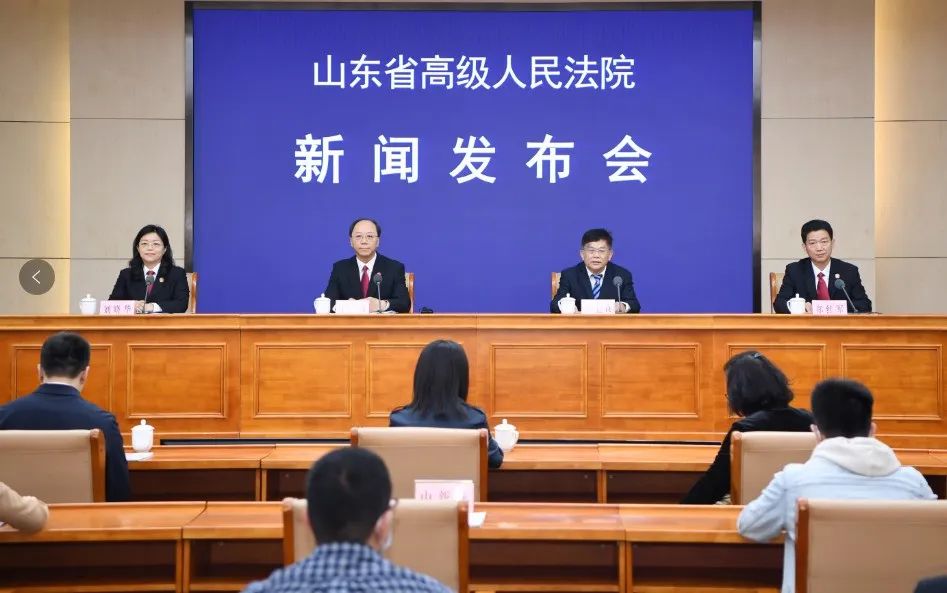
4月21日上午,山东高院召开知识产权宣传周新闻发布会,通报山东法院知识产权司法保护工作有关情况。
会上,山东高院党组副书记、副院长王闯发布了《2022年山东法院知识产权司法保护状况》、《山东省高级人民法院关于加强农业领域知识产权司法保护保障农业强省建设和粮食安全的意见》及《山东法院种业知识产权司法保护典型案例》,山东高院审判委员会委员、知识产权审判庭庭长刘晓华通报了《2022年山东法院十大知识产权案件》。山东高院新闻发言人郑红军主持新闻发布会。
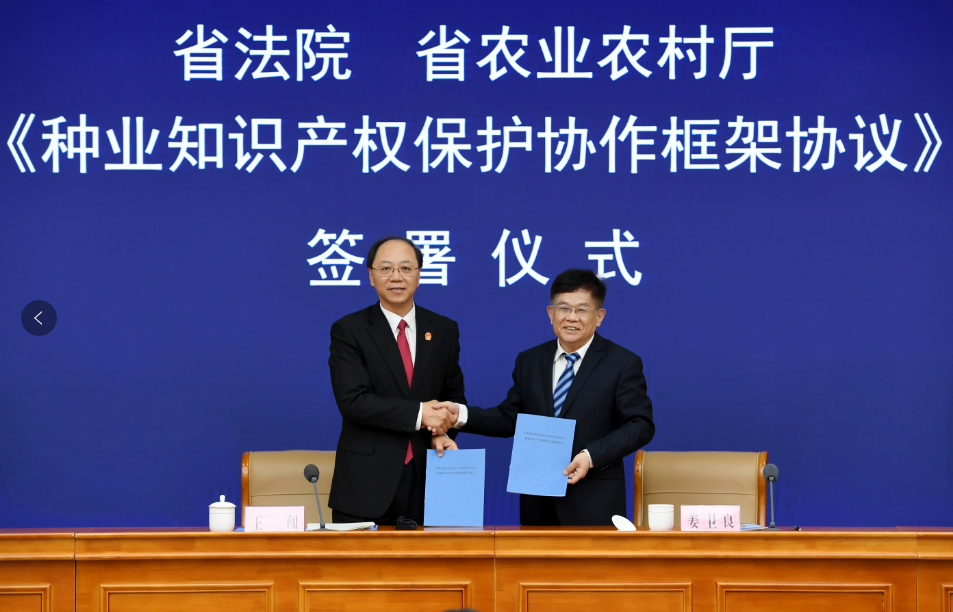
发布会现场, 山东高院与省农业农村厅领导共同会签了《种业知识产权保护协作框架协议》。省农业农村厅领导、人大代表、政协委员、专家学者受邀出席本次发布会。
山东法院知识产权司法保护状况(2022年)
前言
习近平总书记强调,创新是引领发展的第一动力,保护知识产权就是保护创新,要加强知识产权法治保障,形成支持全面创新的基础制度。2022年,山东法院坚持以习近平新时代中国特色社会主义思想为指导,深入贯彻习近平法治思想,全面贯彻落实党的二十大精神,认真学习习近平总书记关于知识产权保护、科技创新和公平竞争等重要论述,完整准确全面贯彻新发展理念,积极服务和融入新发展格局,紧紧围绕山东省知识产权保护大会确定的目标任务,锚定“走在前、开新局”,充分发挥知识产权审判职能,深入推进知识产权审判体系和审判能力现代化,有效服务创新驱动发展战略实施,为知识产权强省建设提供坚实司法保障。
一、案件数量持续高位,审判质效不断提升
山东法院坚持以执法办案为第一要务,充分发挥“三合一”机制效能,准确认定事实,精准适用法律,依法公正高效审理各类民事、刑事、行政知识产权案件。
(一)案件总体情况
2022年,山东法院新收各类知识产权案件23986件,审结24553件,与2021年各类知识产权案件收结案总数基本持平。其中,新收一审案件21082件,同比下降10.47%;二审案件2628件,同比上升21.16%;申请再审案件248件,同比上升143.14%;再审案件28件,同比上升180%。
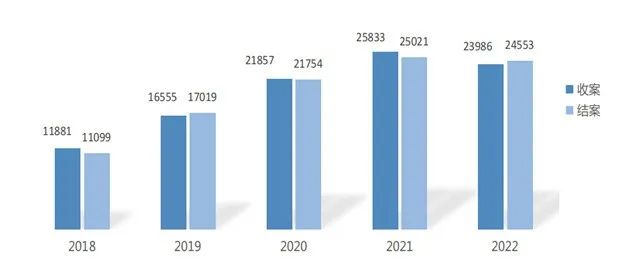
图1 近五年山东法院新收、审结各类知识产权案件数量图
(二)知识产权民事案件情况
2022年,山东法院新收知识产权民事案件23606件,同比下降7.51%,审结24163件,同比下降2.33%。新收知识产权民事一审案件20760件,同比下降10.81%。其中,著作权案件10135件,商标权案件6572件,专利权案件1614件,不正当竞争案件1157件,特许经营合同案件712件。审结21620件,同比下降4.2%。其中,调撤案件13980件,调撤率为64.66%。山东法院持续加大诉源治理和诉前调解工作力度,有效推动知识产权纠纷综合治理、源头治理,知识产权民事案件首次呈现下降态势。

图2 近五年山东法院知识产权民事一审案件数量图
2022年,最高人民法院发布《关于第一审知识产权民事、行政案件管辖的若干规定》及配套文件,批准山东增设20个具有知识产权民事、行政案件管辖权的基层法院,山东法院具有第一审知识产权民事、行政案件管辖权基层法院的数量达到41家,基层法院第一审知识产权民事案件诉讼标的额由50万元提升至100万元。2022年,基层法院新收知识产权民事一审案件16675件,占全省知识产权民事一审案件的80.32%,中级法院新收知识产权民事一审案件4085件,占全省知识产权民事一审案件的19.68%,全省知识产权民事一审案件管辖“金字塔”格局初步形成。
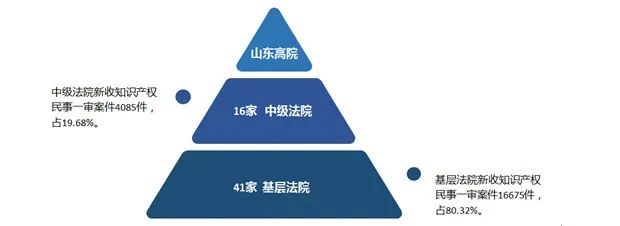
图3 山东三级法院知识产权民事一审案件分布图
2022年,山东法院新收知识产权民事二审案件2587件,同比增长20.61%。其中,著作权案件992件,商标权案件939件,不正当竞争案件272件,特许经营合同案件186件,专利权案件128件。审结2319件,同比增长10.85%。其中,调撤案件898件,调撤率为38.72%。
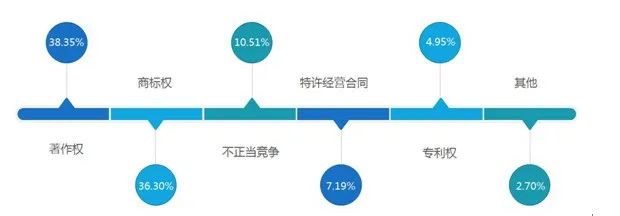
图4 2022年山东法院新收知识产权民事二审案件比例图
2022年,山东高院新收知识产权民事案件1183件,审结909件。其中,二审案件881件,审结645件;申请再审案件213件,审结179件;再审案件17件,审结15件;管辖案件72件,审结70件。
(三)知识产权刑事案件情况
2022年,山东法院新收知识产权刑事案件353件,同比增长21.31%;审结359件,同比增长36.5%。新收知识产权刑事一审案件295件,同比增长15.23%。其中,销售假冒注册商标的商品罪案件134件,假冒注册商标罪案件93件,非法制造、销售非法制造的注册商标标识罪案件36件,侵犯著作权罪案件23件,侵害商业秘密罪案件6件,销售侵权复制品罪案件3件。审结303件,同比增长30.6%。
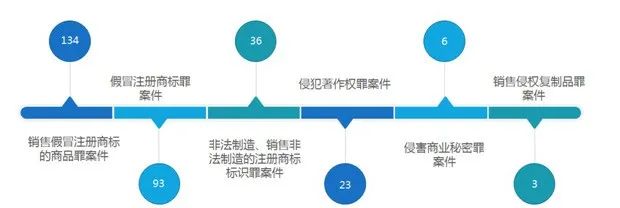
图5 2022年山东法院新收知识产权刑事一审案件数量图
(四)知识产权行政案件情况
山东法院新收知识产权行政一审案件27件,同比增长68.75%;审结31件,同比增长82.35%。其中,专利行政案件20件,商标行政案件7件。

图6 近五年山东法院新收、审结知识产权行政案件数量图
(五)精品案审判再创佳绩
山东法院多年来持续实施和推进以知识产权案件“精细化管理、精品案审判”为核心的“双精”工程,取得显著成效。2022年,精品案审判再创佳绩,共有7件案件入选最高人民法院典型案件案例,在入选数量和质量上均创新高并位居全国前列。其中,大众点评“刷单炒信”不正当竞争案入选“中国法院10大知识产权案件”;“美可辛”商标侵权及不正当竞争案、“长碳链二元酸”发明专利侵权案入选“中国法院50件典型知识产权案例”;“伟科609”玉米植物新品种侵权案、“鲁葫1号”西葫芦植物新品种侵权案入选“人民法院种业知识产权司法保护典型案例”;“混凝土搅拌拖泵”实用新型专利侵权案、“气体喷淋装置”实用新型专利权属纠纷案入选“最高人民法院知识产权法庭裁判要旨”。
二、充分发挥审判职能作用,服务经济社会高质量发展
山东法院牢固树立“保护知识产权就是保护创新”的理念,切实加强知识产权法治保障,服务高水平科技自立自强,努力营造市场化、法治化、国际化一流营商环境,服务经济社会高质量发展。
(一)加强科技创新成果保护
山东法院充分发挥知识产权审判对科技创新的激励和保障作用,加强对科技创新成果保护的规则引领和价值导向,促进技术和产业不断创新升级。2022年,山东法院新收涉技术类知识产权民事一审案件857件,审结952件,妥善审理涉及5G通信、海洋医药、高端装备制造、新能源新材料、植物新品种等高新技术案件。其中,发明专利权案件158件,审结175件;实用新型专利权案件421件,审结445件;计算机软件案件135件,审结176件;植物新品种权案件55件,审结44件;技术合同案件45件,审结52件;技术秘密案件20件,审结24件;其他23件,审结36件。
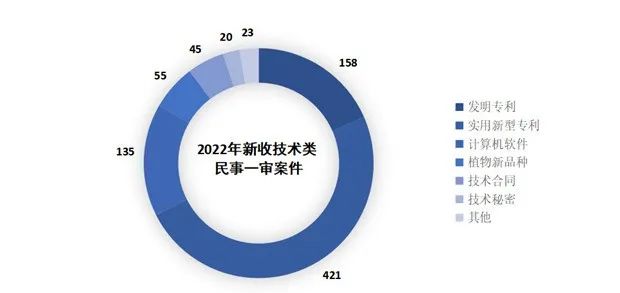
图7 2022年山东法院新收技术类知识产权民事一审案件数量图
山东法院注重加强对“卡脖子”关键核心技术保护,激励技术进步和产业升级。青岛知识产权法庭审理的“长碳链二元酸”发明专利侵权案中,坚持有利保护司法理念,运用证据规则,合理分配举证责任,判决赔偿权利人经济损失共计500万元。该案入选“中国法院50件典型知识产权案例”。山东法院注重加大对具有自主知识产权的重大农业科技成果和植物新品种的保护力度,有效保障国家种业和粮食安全。济南知识产权法庭审理的“鲁葫1号”西葫芦植物新品种侵权案中,根据被诉侵权人在产品包装上使用的名称与授权品种名称相同,推定两者为同一品种,用好司法解释相关规定,及时解决案件事实认定难题。青岛知识产权法庭审理的“伟科609”玉米植物新品种侵权案中,以行政机关查扣的被诉侵权样品作为待测样品进行鉴定,实现行政保护与司法保护的有效衔接。该2案入选“人民法院种业知识产权司法保护典型案例”。青岛知识产权法庭审理的“混凝土搅拌拖泵”及“气体喷淋装置”等2件实用新型专利权属、侵权案件,统一了相关技术类知识产权案件裁判标准,被最高人民法院作为2021年度技术类裁判规则予以推广。
(二)擦亮“好品山东”品牌
山东法院注重加强驰名商标、传统品牌和老字号司法保护,依法支持商标品牌建设,积极引导权利人持续实际使用商标,发挥商标的识别功能,依法惩治商标攀附、仿冒搭车等行为,助力打造更多具有国际竞争力的本土品牌。2022年,山东法院新收涉潍柴、海尔、海信、王麻子、柳工、安踏、欧派、飘柔、PRADA等省内外、国内外知名品牌民事一审案件6572件,审结6034件。山东高院审理的“环球”商标侵权案中,依法认定商标权人于1958年在商标法施行前已经注册的商标继续有效,并且由于商标权人的持续使用,其商标权益一直延续,支持了商标权人的诉讼请求,充分保护了商标权人合法权益;审理的“肛泰”商标侵权案中,依法对公司高管与公司构成共同侵权作出认定,判决公司高管亦承担相应责任,严厉打击中医药商标侵权行为,护航中医药产业高质量发展。
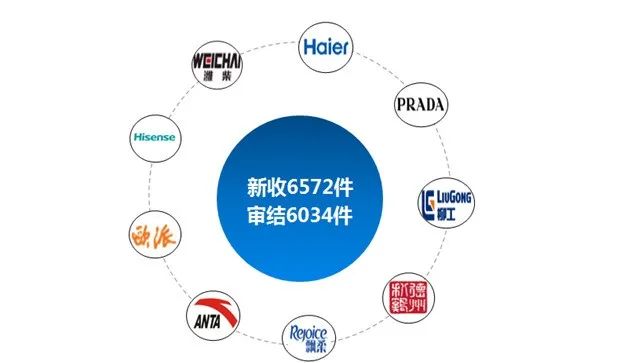
图8 2022年山东法院商标权民事一审案件图
(三)服务保障文化“两创”
山东法院充分发挥著作权审判对于优秀文化的引领和导向功能,扛牢文化“两创”使命担当,依法妥善处理传统文化以及互联网领域文化创作传播的著作权保护新问题,促进我省文化事业发展与繁荣,助力文化强省建设。2022年,山东法院新收著作权案件10135件,审结10623件。其中,侵害作品信息网络传播权案件5328件,审结5420件;侵害作品复制权、发行权案件3299件,审结3280件;侵害作品放映权案件1106件,审结1100件。侵害作品信息网络传播权案件占全部著作权案件的46.2%,是近年来数量最多的著作权类型案件。烟台中院审理的“写真摄影作品”侵害信息网络传播权案中,对“转发”和“转载”在信息网络传播中的不同法律性质作出了区分和界定,进一步规范了网络领域文化传播秩序。淄博中院审理的“知网”侵害信息网络传播权案中,厘清裁判规则,回应社会期待,切实保障著作权人合法权益。

图9 2022年山东法院著作权民事一审案件数量图
(四)维护公平竞争市场秩序
山东法院坚持规范和发展并重,依法妥善审理反垄断和反不正当竞争案件,依法惩治强制“二选一”“刷单炒信”等破坏公平竞争、扰乱市场秩序行为,强化企业公平竞争意识,引导形成崇尚、保护和促进公平竞争的市场环境。2022年,新收不正当竞争案件1157件,审结1236件。其中,仿冒案件764件,审结822件;网络不正当竞争案件283件,审结308件;商业秘密案件53件,审结59件;虚假宣传案件29件,审结27件;其他28件,审结20件。山东高院审理的“海信”诉“TCL”商业诋毁案中,依法惩治利用“短视频”宣传虚假及误导性信息、损害竞争对手商誉的商业诋毁行为,将赔偿数额由一审判决的50万元提高到200万元,规范“短视频”宣传内容,净化市场竞争环境。青岛知识产权法庭审理的大众点评“刷单炒信”不正当竞争案中,严惩利用刷单方式炒作网络经营者信誉、损害平台经营者和消费者合法权益的不正当竞争行为,维护市场公平竞争秩序,该案入选“中国法院10大知识产权案件”。

图10 2022年山东法院不正当竞争民事一审案件数量图
(五)积极服务高水平对外开放
山东法院依法平等保护中外当事人合法权益,积极营造开放、公平、公正、非歧视的科技发展环境和市场化、法治化、国际化一流营商环境,服务统筹国内国际“两个大局”,坚决维护国家主权、安全、发展利益,推动互利共赢的国际经贸合作。2022年,山东法院新收涉外及涉港澳台知识产权民事一审案件469件,审结457件。其中,涉外商标权案件275件,审结262件;涉外著作权案件150件,审结160件;涉外专利权案件17件,审结24件。在涉外商标侵权案件中,涉及普拉达、路易威登、北面、耐克、轩尼诗等国际知名品牌,涉及服装、香水、酒类等多种商品。山东高院审理的“美可辛”商标侵权及不正当竞争案中,在侵权人拒不提交财务账簿资料的情形下,法院依据侵权人全方位攀附权利人商誉实施长期侵权等事实,全额支持权利人1000余万元的赔偿诉求,依法从重打击侵权行为,该案入选“中国法院50件典型知识产权案例”。
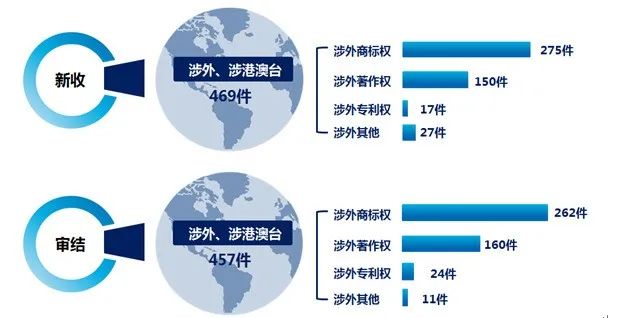
图11 2022年山东法院涉外涉港澳台知识产权民事一审案件数量图
三、深化体制机制创新,推进审判体系和审判能力现代化
山东法院大力发扬改革创新的时代精神,坚持深化改革和科技赋能双轮驱动,推进审判体系和审判能力现代化,努力提升知识产权司法保护能力和水平。
(一)严格落实惩罚性赔偿制度
习近平总书记高度重视知识产权惩罚性赔偿,多次指出在知识产权保护中实施惩罚性赔偿。山东省委办公厅、省政府办公厅《贯彻落实<关于加强知识产权审判领域改革创新若干问题的意见>实施意见》提出,准确适用知识产权赔偿原则,加大惩罚性赔偿力度。为贯彻落实中央决策部署和省委工作安排,准确适用《最高人民法院关于审理侵害知识产权民事案件适用惩罚性赔偿的解释》,山东高院在全国率先制定发布《关于审理侵害知识产权民事案件适用惩罚性赔偿的裁判指引》,细化知识产权惩罚性赔偿适用标准,明确审理侵害知识产权民事案件适用惩罚性赔偿的总体要求和具体措施,强力提升山东知识产权司法保护力度。《人民法院报》在头版进行了专题报道。为指导山东法院审理好相关案件,山东高院发布《关于审理侵害知识产权民事案件适用惩罚性赔偿的裁判指引的说明》,对裁判指引条文制定的背景、依据以及如何具体适用进行了详细说明,刊发于《山东知识产权审判参考》。
(二)优化知识产权审判格局
2022年,经最高人民法院批准,山东增设20家具有知识产权民事、行政案件管辖权的基层法院,具有知识产权管辖权基层法院的数量达到41家。山东法院持续加强重点开发区(园区)知识产权巡回审判庭建设,青岛中院先后设立烟台保护中心知识产权巡回审判庭、莱西莱阳一体化发展先行区知识产权巡回审判工作站,滨州中院设立高新区知识产权巡回审判庭,聊城中院设立经济技术开发区知识产权巡回审判庭,菏泽中院设立曹县知识产权巡回审判庭。山东法院目前已形成“1+2+15+41”知识产权审判格局,以山东高院知识产权审判庭为牵引,济南、青岛2个知识产权法庭为示范、其他15个中级法院知识产权审判庭为重点,41个基层法院知识产权审判庭为支撑,同时在重点开发区(园区)设立知识产权巡回审判庭21处,知识产权管辖布局进一步优化,知识产权审判体系进一步完善。
(三)深化知识产权“三合一”改革
根据《山东省高级人民法院关于全面推进知识产权审判“三合一”工作的实施方案》部署,山东三级法院知识产权案件“三合一”审判机制改革工作有序开展。2022年,烟台、淄博、枣庄、泰安、日照、滨州、菏泽中院制定符合当地审判实际的知识产权“三合一”实施方案,通过与市公安局、市检察院会签合作框架协议等方式积极构建完善与知识产权“三合一”相适应的案件管辖制度、协调工作机制。目前,青岛、东营、威海三地全面实现中院、基层两级法院知识产权“三合一”,济南、潍坊、济宁、德州、菏泽五地实现中院知识产权“三合一”,知识产权民事、行政和刑事诉讼程序衔接进一步完善,知识产权审判质效进一步提升,全省法院“三合一”审判机制实质化推进成效明显。
(四)加强知识产权法庭建设
知识产权法庭的设立是技术类知识产权案件司法保护的新型举国体制。山东高院大力支持最高人民法院知识产权法庭试点工作,2022年,山东高院在全省范围选派2名优秀法官和2名优秀法官助理到最高人民法院知识产权法庭学习锻炼,目前山东法院已累计向最高人民法院选派法官和助理11名。按照最高人民法院工作安排,积极参加最高人民法院知识产权法庭试点评估座谈会,为推动完善国家层面知识产权案件上诉审理机制建言献策。2022年山东高院被最高人民法院表彰为“知识产权法庭试点工作表现突出集体”。济南、青岛知识产权法庭是全国技术类知识产权案件专门化审判体系的重要组成部分,两法庭成立以来对山东知识产权审判的龙头带动效果明显,有效服务保障国家创新驱动发展战略,为知识产权强省建设做出了应有的贡献。2022年,两法庭辖区内受理一审、二审、申请再审等各类知识产权案件9283件,审结9557件,占山东知识产权案件总数的40%,多起案件被最高人民法院评为典型案例。济南知识产权法庭开展植物新品种司法保护调研工作,形成《积极构建大保护格局促进现代种业创新发展》调研报告。青岛知识产权法庭发挥跨域管辖优势,与威海、潍坊等地中院、市场监督管理局签订跨域保护合作协议,举办胶东半岛知识产权司法与行政协同保护工作交流会,推动胶东经济圈一体化保护;围绕“打造国际化创新型城市”工作部署,对集成电路、生物医药等新型产业走访调研,明确企业司法需求,开展精准司法服务。
(五)推进技术调查人才库建设
山东高院指导济南、青岛知识产权法庭根据最高人民法院关于技术调查官相关规定,出台技术咨询专家、技术调查官、专家陪审员管理办法、实施细则等,规范专家参与诉讼工作,充分发挥知识产权司法保护专家智库作用,有效提升知识产权案件技术事实认定水平。青岛知识产权法庭完成第二批技术咨询专家、技术调查官选聘工作,出台《技术调查官参与诉讼活动暂行办法》《专家咨询委员会章程》,聘任技术调查官28名、技术咨询专家54名,协助法官准确理解和高效查明专业技术问题。两法庭现已通过配备技术调查官、专家陪审员审理案件59件,逐步实现技术专家参与庭审、勘验、保全等诉讼活动常态化。下一步,山东高院将建立山东法院技术调查人才库并接入最高人民法院“全国法院技术调查人才库”,完善技术调查人才资源共享机制并建立与最高人民法院技术调查官调派衔接机制。
(六)深化智慧法院建设
山东法院扎实推进信息技术与司法工作深度融合,积极推进互联网、人工智能、大数据等现代科技在司法领域的深度应用, 实现信息化建设与知识产权审判深度融合。进一步完善知识产权案例和裁判文书数据库深度应用, 在充分利用好最高人民法院现有“知己”“知彼”知识产权裁判规则库的基础上,大力推进山东法院精准化案例规则库建设,2022年共录入知识产权案例179条。根据山东智慧法院 4.0 类案审理模块系统推广应用工作部署,完成商标权、信息网络传播权、作品发行权等侵权类知识产权案件要素化模块建设,促进裁判标准统一。实现互联网庭审常态化,山东高院知识产权案件互联网审理率达到93.56%。山东法院知识产权文书全年送达24273次,其中,电子送达23978次,电子送达率达到98.8%。青岛知识产权法庭上线跨网域异步质证系统,当事人在线上传电子化证据材料,庭前程序更加便捷高效,该系统被最高人民法院在全国宣传推广;持续深化完善“智能3D证据管理系统”应用,出台《知识产权智能3D证据管理规定》,完成建模832件次,进一步推进规范化体系化建设。济南知识产权法庭出台《知识产权审判“智能3D证据”管理规范》,完成建模630件次。
四、凝聚保护合力,构建知识产权大保护格局
山东法院凝聚社会各方主体力量,强化协同配合,积极构建知识产权大保护格局,厚植尊重创新、保护创造的法治氛围。
(一)健全行政与司法协同保护
山东法院深度参与知识产权保护体系工程建设,加强与知识产权行政主管部门沟通协调,参与省知识产权保护和促进条例、知识产权强省建设纲要、质量强省建设纲要等地方法规、政策制定。山东高院与省科技厅签署《依法促进科技创新协作框架协议》,加快推进科技与法治融合,促进科技创新发展;与省市场监督管理局、省检察院联合制定《关于强化反垄断行政执法与司法衔接协作的实施意见》,形成反垄断工作合力;与省版权局联合发布“山东省著作权保护十大案件”,加强著作权多维度保护;与省检察院召开知识产权司法保护工作座谈会,推动知识产权案件“三合一”等工作协调对接;与省农业农村厅建立交流合作长效机制,激励育种创新和保障种业科技自立自强。淄博中院与市市场监督管理局合作编写《知识产权司法维权指南》,营造保护创新的良好社会氛围。
(二)完善多元化纠纷解决机制
山东法院注重提升新时代人民法院化解矛盾纠纷能力,切实将非诉讼纠纷解决机制挺在前面,充分发挥人民法院调解平台作用,积极参与社会治理创新,枣庄、烟台、潍坊、泰安、滨州、德州、聊城、临沂、菏泽等中院,济南历下、章丘,青岛市南、胶州,淄博周村,聊城临清,菏泽东明等基层法院分别与各地市场监督管理局、文化与旅游局、司法局、仲裁委等座谈、联合出台知识产权纠纷诉调对接机制实施意见、知识产权案件行政调解协议司法确认工作实施办法,充实知识产权调解员队伍、加强调解员培训,建立市场监督管理局、仲裁委分流调解及司法局选派人民调解员驻院调解,法院跟进业务指导的知识产权诉前调解模式,为当事人提供便捷、高效的纠纷化解途径。深入推进知识产权行政调解司法确认工作制度化、常态化,促进知识产权纠纷依法、公正、高效化解,“行政调解+司法确认”是知识产权保护的重要举措,通过司法确认既有效发挥行政机关以调解方式化解知识产权纠纷的高效便捷优势,又赋予知识产权纠纷调解协议更强法律效力,依法保障调解协议履行,2022年山东法院知识产权行政调解司法确认案件146件。
(三)加强知识产权司法交流
山东高院应邀参加第三届跨国公司领导人青岛峰会,并以“全面加强知识产权司法保护营造市场化法治化国际化营商环境”为题作主旨演讲;作为省直政法系统唯一代表参加省政府新闻办知识产权强省建设纲要新闻发布会,介绍山东法院服务保障知识产权强省建设亮点工作;济南中院作为全国法院系统唯一代表,在“全国保护种业知识产权打击假冒伪劣套牌侵权视频会议”上作典型发言,介绍山东种业司法保护经验做法;山东法院积极开展知识产权保护进企业、进单位、进社区、进学校活动,委派法官进高校就知识产权司法保护进行授课,应省文联邀请就新媒体时代文艺领域著作权维权进行座谈。滨州中院与市职业学院签署《知识产权保护理论与实践研究合作框架协议》,共建“知识产权保护理论研究基地”和“知识产权教科研实践基地”。
(四)强化知识产权法治宣传
山东高院连续21年组织开展“4·26世界知识产权日”宣传活动,召开新闻发布会,发布《2021年山东法院知识产权司法保护状况(中英文版)》和《2021年山东法院十大知识产权案件》,进行中英文发布成为山东法院知识产权司法公开新常态。组织开展贯彻实施民法典“五个一百”活动,全省知识产权审判干警积极参与,推荐知识产权优秀裁判文书、典型案例、庭审直播,制作“法官说典”短视频,营造全民学典、用典、守典的良好法治氛围。全省各中院认真组织开展“4·26世界知识产权日”宣传活动,发布知识产权司法保护白皮书,评选知识产权司法保护年度十大案件,宣传知识产权司法保护工作成果;邀请人大代表、政协委员等旁听典型案件庭审,以公开展现公正,不断提高司法公信力。济南知识产权法庭召开“互联网+”创新创业综合示范园高新企业环境宣传座谈会,青岛知识产权法庭与市律协举办知识产权惩罚性赔偿制度适用研讨会,济南、青岛、淄博、东营、泰安、威海、德州、聊城、临沂等中院,济南章丘,青岛即墨、胶州,淄博周村,烟台招远等基层法院主动向企业提供法律咨询、信息交流、诉前调解、纠纷预警等服务,积极赋能企业创新发展。
五、加强调研指导,精准发力提升审判质效
山东法院坚持问题导向,担当作为,通过调查研究,发现问题,解决问题,坚持融入日常,加强审判指导,不断提高知识产权审判质量、效率、效果。
(一)加强调查研究
山东高院立足山东知识产权审判工作实际,充分发挥头雁效应,大兴调查研究之风。山东高院联合山东省知识产权研究院、烟台大学法学院对惩罚性赔偿相关问题进行调研,并举办知识产权惩罚性赔偿疑难问题研讨会,在充分调研的基础上形成4万余字的《知识产权惩罚性赔偿制度研究报告》,为之后裁判指引的制定发布打下坚实基础。在知识产权案件管辖权调整后,山东高院与潍坊中、基层法院联动调研,聚焦“一审如何准确查明事实、实质化解纠纷;二审如何有效终审、精准定分止争;再审如何依法纠错、统一裁判尺度”,最终形成《侵害商标权类案解纷研究》调研报告,对全省该类型案件进行有效指导。济南知识产权法庭制定《加强知识产权司法保护服务保障优化环境和创新驱动发展的意见》,助力经济社会创新发展。青岛知识产权法庭形成《关于海洋生物医药产业知识产权司法保护的调研报告》《集成电路产业知识产权司法保护调研报告》,及时掌握新领域新业态司法保护需求,针对特许经营案件中存在的问题向市商务局、市市场监督管理局发出司法建议,规范特许经营行业健康发展。东营中院制定《关于支持黄河三角洲农业高新技术产业示范区高质量发展的六条措施》,服务农业高新产业。滨州中院制定《关于加强知识产权司法保护推进法治化环境建设的实施意见》,助力营造法治化营商环境。
(二)强化审判指导
山东高院年初围绕最高人民法院相关工作要点,结合山东知识产权审判实际,制定《2022年山东法院知识产权审判工作要点》并下发全省,明确全年工作任务和工作重点;搭建省级层面知识产权审判工作指导和交流平台,每两个月编发一期《山东知识产权审判参考》,刊载最高人民法院最新司法解释、司法政策、典型案例以及全省法院知识产权司法保护经验做法,不断拓宽审判指导渠道;在对全省一审案件情况和二审案件改判原因分析的基础上形成《2021年山东法院知识产权一审案件运行态势分析报告》《2021年山东省高级人民法院知识产权民事二审案件改判情况及典型案件分析报告》,梳理山东法院一、二审知识产权案件审理中存在的问题,统一裁判标准;对如何准确把握作品认定标准,规范涉表情包美术作品侵权赔偿数额以及权利人分别起诉多个销售商和相同制造商如何确定民事责任等问题及时研判裁判规则,加强对下指导。济南知识产权法庭举办全市法院知识产权审判二审发改分析培训会,青岛知识产权法庭召开全市知识产权案件管辖调整工作座谈会,淄博中院研究制定《知识产权案件法律适用疑难问题解答》,临沂中院形成解决类案标准认定、文书送达、公证文书效力等5个方面20个问题的工作方法,统一基层法院裁判尺度,提升两级法院审判水平。
六、加强队伍建设,提升服务保障能力
山东法院始终坚持以党建带队建促审判,全面加强队伍革命化、正规化、专业化、职业化建设,坚持政治素质、业务素质、职业道德素质建设相统一,努力锻造一支政治坚定、顾全大局、精通法律、熟悉技术并具有国际视野的知识产权审判队伍。
(一)强化政治引领
山东法院坚持以习近平新时代中国特色社会主义思想为指导,深入贯彻习近平法治思想,确保知识产权审判工作的正确政治方向。将学习宣传贯彻党的二十大精神作为首要政治任务,积极参加集中培训、专题研讨、知识测试等学习活动,充分利用“学习强国”“灯塔-党建在线”等平台开展线上学习,切实把干警思想统一到党的二十大精神上来。以党建带队建促审判,山东高院知识产权审判庭坚持每月开展4次以上集体学习,积极开展特色主题党日活动。充分发挥青年理论学习小组作用,形成《发挥审判职能,服务推动“十大创新”落实落地》调研报告,积极开展知识产权主题青年理论联学活动。青岛知识产权法庭开展“锐意创新建设未来”知识产权与青年座谈会、“庆祝祖国华诞及法庭成立五周年”等活动,推进党建与审判深度融合。
(二)提升专业能力
山东法院着力加强知识产权法官专业化培养。山东高院通过“线上+线下”方式举办山东法院知识产权审判实务培训班,邀请最高人民法院多位资深法官授课;认真组织参加最高人民法院“新知讲堂”培训活动;选派2名基层法官参加国家法官学院“知识产权案件办理疑难复杂问题”同堂培训专题研修班;加强审判业务学习,邀请全国审判业务专家就审判实务、文书写作问题进行授课。济南、青岛、菏泽等中院通过举办全市法院知识产权审判业务培训班等方式,努力提升知识产权审判业务水平。2022年,2名知识产权法官被省人社厅评为“山东省优秀法官”,5名知识产权法官获评“全省法院审判业务专家”。
(三)淬炼职业道德素质
山东法院深入践行司法为民宗旨,坚持严格公正司法,认真履行维护国家政治安全、确保社会大局稳定、促进社会公平正义、保障人民安居乐业的职责使命,聚焦人民群众急难愁盼问题,切实加强民生司法保障。深入贯彻新时代政法干警“十个严禁”,弘扬人民司法优良传统,创新警示教育方式方法,严格落实防止干预司法“三个规定”等铁规禁令,用足用好“四种形态”,一体推进不敢腐、不能腐、不想腐制度机制建设。
结束语
2023年是全面贯彻落实党的二十大精神开局之年,是实施“十四五”规划承上启下关键之年。山东法院将更加紧密地团结在以习近平同志为核心的党中央周围,坚持以习近平新时代中国特色社会主义思想为指导,深入贯彻习近平法治思想,坚持讲政治、顾大局,促公正、提效率,重自律、强队伍,为大局服务、为人民司法,坚持公正与效率的统一,牢固树立“保护知识产权就是保护创新”理念,全面深化知识产权审判领域改革创新,扎实开展学习贯彻习近平新时代中国特色社会主义思想主题教育,更好发挥知识产权审判职能作用,全面提升知识产权审判质量、效率、效果,推动知识产权审判工作高质量发展,为知识产权强省建设提供有力司法服务和保障。
英文版
Intellectual Property Protection
by Shandong Courts in 2022
Preface
General Secretary Xi Jinping emphasized that innovation is the primary force propelling development, that protecting intellectual property rights protects innovation, and that legal protection for intellectual property rights as well as a fundamental system for all-around innovation should be strengthened and established. In 2022, guided by Xi Jinping Thought on Socialism with Chinese Characteristics for a New Era, Shandong courts strictly adhered to the guidance of Xi Jinping Thought on Rule of Law, applied the spirits of the 20th CPC National Congress in all its operations, earnestly studied General Secretary Xi Jinping’s important expositions on topics such as intellectual property rights protection, scientific and technological innovation, and fair competition, fully and faithfully applied the new development philosophy on all fronts, and actively served and integrated into the new pattern of development. By closely focusing on the goals and tasks set by the Shandong Intellectual Property Rights Protection Conference, with the aim to “Taking the lead and Opening up New Prospects,” Shandong courts fully leveraged the role of intellectual property trials, further promoted the modernization of the intellectual property trial system and its capacity, so as to effectively facilitate the implementation of the innovation-driven development strategy, and provide solid judicial guarantees for building a province with powerful intellectual property rights.
I. Significant Increase of Cases and Continuous Improvement in Trial Quality and Efficiency
Shandong courts strictly adhered to prioritizing law enforcement and case handling, gave full play to the effectiveness of the “three-in-one” mechanism, and efficiently and fairly adjudicated various civil, criminal, and administrative intellectual property cases in accordance with the law by accurately identifying the facts and accurately applying the law.
(I) Overview of Cases
In 2022, Shandong courts newly accepted a total of 23,986 intellectual property cases and concluded 24,553 cases, which is comparable to the situation in 2021. There were 21,082 cases of first-instance, down by 10.47% year-on-year (YoY); 2,628 cases of second-instance, up by 21.16% YoY; 248 petitions for retrial, up by 143.14% YoY; and 28 cases of retrial, up by 180% YoY.
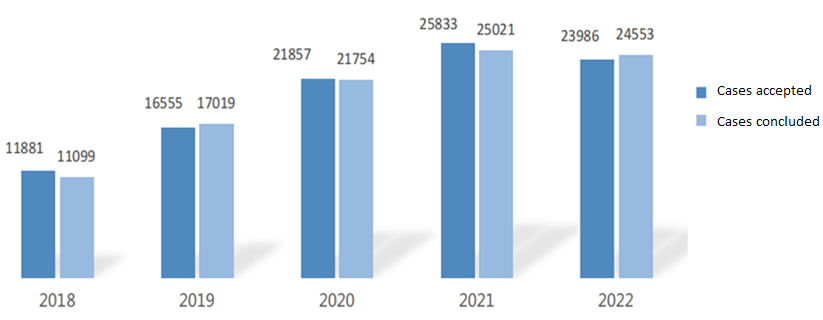
Fig. 1. The number of intellectual property cases accepted and concluded by Shandong courts in the past 5 years
(II) Overview of Civil Intellectual Property Cases
In 2022, Shandong courts newly accepted a total of 23,606 civil intellectual property cases, down by 7.51% YoY, and concluded 24,163 cases, down by 2.33% YoY. Shandong courts newly accepted a total of 20,760 civil intellectual property cases of first-instance, down by 10.81% YoY. Among them, there were 10,135 copyright cases, 6,572 trademark cases, 1,614 patent cases, 1,157 unfair competition cases, and 712 franchise contract cases. In all, 21,620 cases were concluded, down by 4.2%YoY. Among the concluded cases, 13,980 cases were concluded through mediation or withdrawal, with a mediation and withdrawal rate of 64.66%.Shandong courts continued to strengthen the work of litigation sources governance and pre-litigation mediation to effectively promote the resolution of the intellectual property right disputes at the source in a comprehensive way. Consequently, intellectual property civil cases showed a downward trend for the first time.
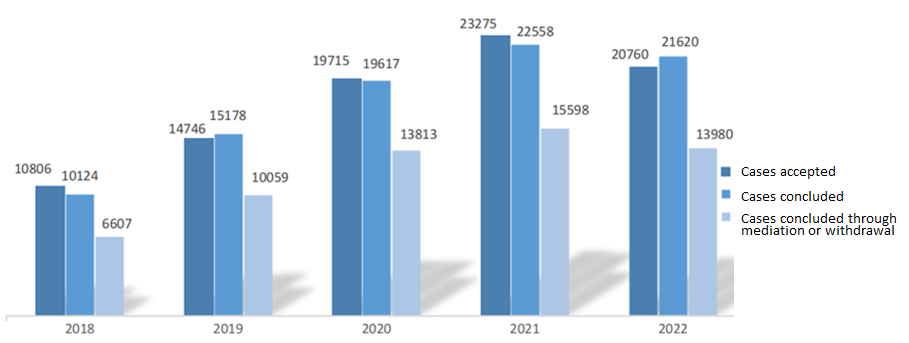
Fig. 2. Civil intellectual property cases of first-instance in Shandong courts in the past five years
In 2022, the Supreme People’s Court issued the Several Provisions on Jurisdiction over Intellectual Property Civil and Administrative Cases of First Instanceand its supporting documents, approving the establishment of 20 grassroots courts in Shandong with jurisdiction over civil and administrative intellectual property cases. The number of such grassroots courts in Shandong reached 41, and the value of the subject matter of civil and administrative intellectual property cases of first-instance handled by these courts grew from RMB 500,000 to RMB 1 million. In 2022, Shandong grassroots courts newly accepted 16,675 civil intellectual property cases of first-instance, accounting for 80.32% of all civil intellectual property cases of first-instance. Shandong intermediate courts newly accepted 4,085 civil intellectual property cases of first-instance, accounting for 19.68%. An initial “pyramid” pattern of jurisdiction over civil intellectual property cases of first-instance was thus formed in Shandong Province.
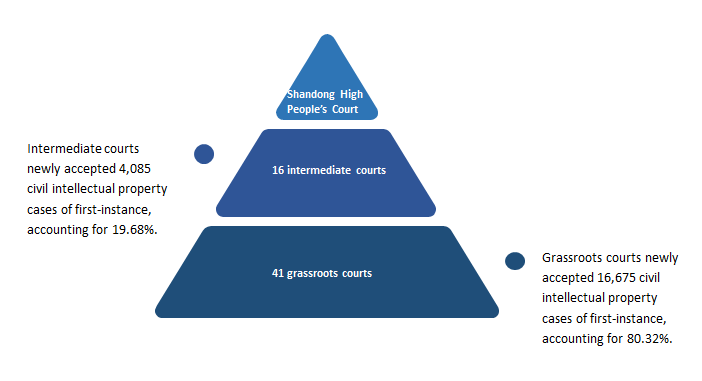
Fig. 3. Distribution of cases in Shandong High People’s Court, intermediate courts, and grassroots courts
In 2022,Shandong courts newly accepted 2,587 civil intellectual property cases of second-instance, up by 20.61% YoY. Among them, there were 992 copyright cases, 939 trademark cases, 272 unfair competition cases, 186 franchise contract cases, and 128 patent cases. During the year, Shandong courts concluded a total of 2,319 intellectual property cases of second-instance, up by 10.85% YoY. Among the concluded cases, 898 cases were concluded through mediation or withdrawal , and the rate of mediation and withdrawal was 38.72%.
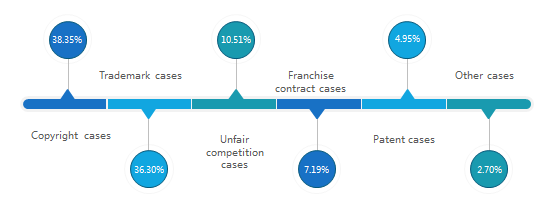
Fig. 4. Percentage of civil intellectual property cases of second-instance newly accepted by Shandong courts in 2022
In 2022, the Shandong High People’s Court newly accepted 1,183 civil intellectual property cases and concluded 909 cases. Among them, there were 881 cases of second-instance with 645 concluded; 213 petitions for retrial with 179 concluded; 17 cases of retrial with 15 concluded; and 72 jurisdiction cases with 70 concluded.
(III) Overview of Criminal Intellectual Property Cases
In 2022, Shandong courts newly accepted 353 criminal intellectual property cases, up by 21.31% YoY and concluded 359 cases, up by 36.5% YoY. Among them, there were 295 criminal intellectual property cases of first-instance, up by 15.23% YoY. There were 134 criminal cases of selling goods with counterfeited registered trademarks, 93 criminal cases of counterfeiting registered trademarks, 36 criminal cases of illegally manufacturing or selling illegally manufactured logos of registered trademarks, 23 criminal cases of copyright infringement, 6 criminal cases of trade secret infringement, and 3 criminal cases of selling infringing copies. In all, 303 cases were concluded, up by 30.6% YoY.
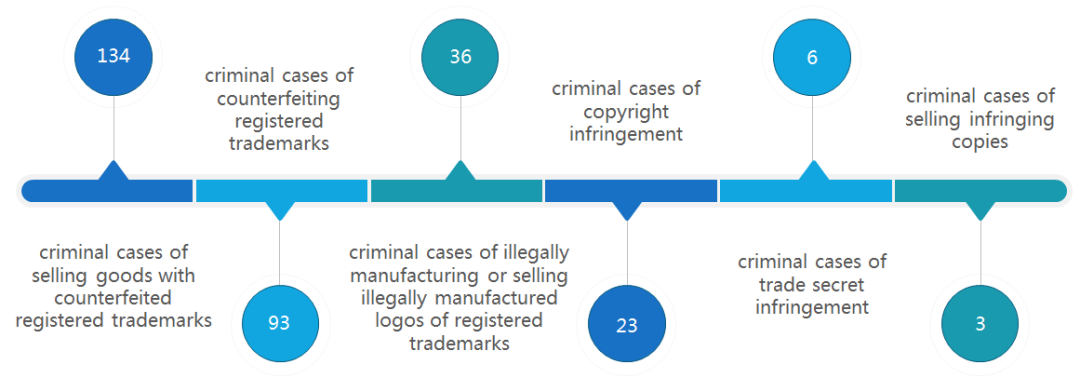 Fig. 5. The number of criminal intellectual property cases of first-instance newly accepted by Shandong courts in 2022
Fig. 5. The number of criminal intellectual property cases of first-instance newly accepted by Shandong courts in 2022
(IV) Overview of Administrative Intellectual Property Cases
Shandong courts newly accepted 27 administrative intellectual property cases of first-instance, up by 68.75% YoY and concluded 31 cases, up by 82.35% YoY. Among them, there were 20 patent administrative cases and 7 trademark administrative cases.

Fig. 6. Thenumber of administrative intellectual property cases accepted and concluded by Shandong courts in the past five years
(V) New Achievements in Model Case Trials
For many years, Shandong courts have consistently implemented and promoted a project focused on “refined management and model case trials” of intellectual property cases, and have achieved remarkable results. In 2022, new achievements were made in the trial of model cases, with a total of 7 cases selected as typical cases by the Supreme People’s Court, reaching a new high in both the number and the quality of selected cases and ranking top among peers in China. Among the cases, the unfair competition case of dispute over “Click farming and fraudulent credit speculation”of Dianping.com was listed as one of “Top 10 IP Cases of Chinese Courts.” The case of dispute over trademark infringement and unfair competition of “MicroEssentials” and the case involving patent infringement of “long carbon chain dicarboxylic acid (DCAs)” were listed in the “50 Typical IP Cases of Chinese Courts.” Two cases involving the infringement of new plant variety of "Weike 609" maize and "Luhu No.1" zucchini, were listed in the “Typical Cases on the IP Judicial Protection of the Seed Industry by the People’s Courts.” The case involving infringement of utility patents of “concrete mixing trailer pump” and the case involving the ownership of utility patents of“gas spraying device,” were listed in the “Judgment Abstracts of the Intellectual Property Court of the Supreme People’s Court.”
II. Giving Full Play to the Role of Intellectual Property Trials to Support High-quality Economic and Social Development
Based on the firm belief that “protecting IP rights is to protect innovation itself,” Shandong courts have effectively strengthened the legal protection ofintellectual property rights and are serving sci-tech self-reliance and self-strengthening at higher levels and endeavoring to foster a market-oriented, law-based, and internationalized first-class business environment, so as to serve high-quality economic and social development.
(I) Strengthening the Protection of Scientific and Technological Innovation Achievements
Shandong courts have served the function on role of IP-case adjudication to encourage and guarantee scientific and technological innovation. By reinforcing rule guidance and value orientation for protection of scientific and technological innovation achievements, the courts facilitated technological progress and industrial upgrading continuously. In 2022, Shandong courts newly accepted 857 civil technology-related intellectual property cases of first-instance and concluded 952 cases. The courts effectively handled IP cases of high-tech fields such as 5G communication, marine pharmaceuticals, high-end equipment manufacturing, new energy and new materials, and new plant varieties. Among the cases, there were 158 cases of patent for invention, with 175 concluded; 421 cases of patent for utility models, with 445 concluded; 135 cases of disputes over computer software copyright, with 176 concluded; 55 cases of new plant varieties, with 44 concluded; 45 cases of disputes over technical contracts, with 52 concluded; 20 cases of disputes over technical secrets, with 24 concluded; and 23 other cases, with 36 concluded.
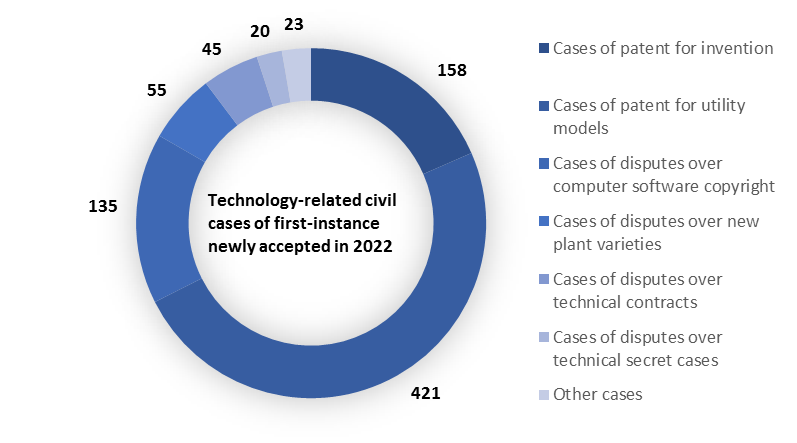
Fig. 7. Technology-related IP civil cases of first-instance newly accepted by Shandong courts in 2022
Shandong courts focused on strengthening the protectionof Key and Core Technologies and stimulated scientific and technological progress and industrial upgrading. In the case involving patent infringement of“long carbon chain dicarboxylic acid (DCAs)”, the Qingdao Intellectual Property Tribunal stuck to the judicial ideal of pro-IP protection, reasonably allocated the burden of proof by applying evidentiary rules, and awarded a total of RMB 5 million in compensation for economic losses suffered by the right holder. The case was listed in the “50 Typical IP Cases of Chinese courts.” Shandong courts have emphasized on increasing protection for major agricultural scientific and technological achievements and new plant varieties with independent intellectual property rights, to effectively guarantee the security of the Chinese seed and food industries.In the case involving the infringement of new plant variety of “Luhu No. 1,” the Ji’nan Intellectual Property Tribunal determined that as the plant nameused by the infringer on the product package were the same as that of the authorized variety, the two fall into the same variety, thereby duly solving the difficulty in identifying the facts of the case using relevant provisions of judicial interpretation. In the case involving the infringement of new plant variety of “Weike 609,”Qingdao Intellectual Property Tribunal tested the involved infringing samples confiscated by the administrative organ as samples for variety identification, thereby realizingeffective coordination between administrative protection and judicial IP protection. These two cases were listed in the “Typical Cases on the IP Judicial Protection of the Seed Industry by the People’s Courts.” In hearing the cases involving the ownership and infringement of utility patents of “concrete mixing trailer pump” and “gas spraying device,” Qingdao Intellectual Property Tribunal established the judgment standards for cases of related technical intellectual property, which werepromoted by the Supreme People’s Court as the“rule of technical judgmentof the year 2021.”
(II) Building the “Remarkable Shandong” Brand
Shandong courtsemphasized on strengthening judicial protection for well-known trademarks and traditional and time-honored brands, supported the building of trademark brands in accordance with law, actively guided rights holders to continue practical implementation of trademarks to exert the function of trademarks in brand recognition, and punished trademark free-riding,counterfeiting, etc. according to law, helping build more local brands that are internationally competitive. In 2022, Shandong courts newly accepted 6,572 civil cases of first-instance involving domestically and internationally well-known brandsincluding Weichai, Haier, Hisense, WangMazi, Liu Gong, Anta, Oppein, Rejoice, PRADA, etc., and concluded 6,034 cases. In thetrademark infringementcase ofHuanqiu, Shandong High People’s Court determined that the trademark registered by the trademark holder in 1958 before the implementation of the Trademark Law would remain valid, and that since the trademark had been continuously in use by the trademark holder, the rights and interests in the trademarkwould remain unchanged. The court supported the trademark owner’s claims and fully protected its legitimate rights and interests. In thetrademark infringement case of “Gang Tai”, Shandong High People’s Court determined that the company’s executives and the company had committed joint infringement and judged that the company’s executives should bear corresponding responsibilities, which dealt a severe blow on the infringement of traditional Chinese medicine trademarks, thus safeguarding high-quality development of the traditional Chinese medicine industry.
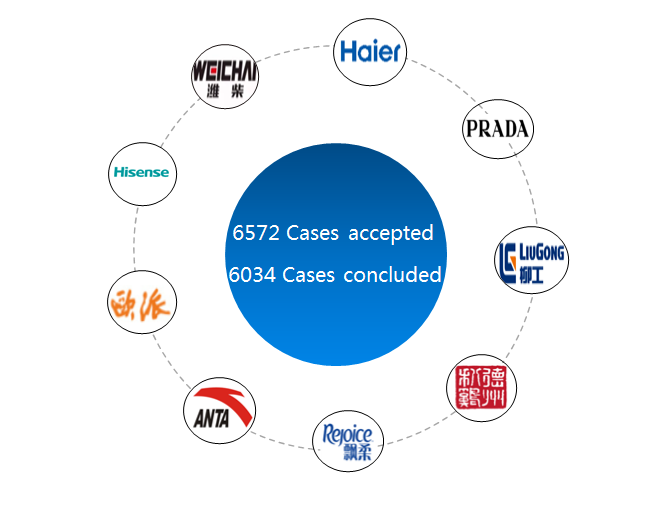
Fig. 8. Civil trademark cases of first-instance in Shandong courts in 2022
(III) Serving and Guaranteeing Cultural Innovative Transformation and Development
Shandong courts gave full play to the guiding role of copyright adjudication for refined culture, shouldered the mission of innovative transformation and development of refined traditional Chinese culture, appropriately handled new issues concerning copyright protection of traditional and internet-based cultural works as well as their dissemination as per law, promoted the development and prosperity of cultural undertakings of Shandong, and facilitated the development of Shandong into a culturally strong province. In 2022, Shandong courts newly accepted 10,135 copyright cases and concluded 10,623 cases. Among them, there were 5,328 cases involving the infringement of the right of information network dissemination, with 5,420 Cases concluded; there were 3,299 cases involving the infringement of the rights of reproduction and distribution of works, with 3,280 concluded; 1,106 cases involving the infringement of the right of show, with 1,100 concluded. Cases involving the infringement of the right of information network dissemination accounted for 46.2% of all copyright cases, making this the most prevalent type of copyright case in recent years. In the case of infringement of the right of information network dissemination of photographic works heard by Yantai Intermediate People’s Court, the legal natures of “forwarding” and “reprinting” in the right of information network dissemination were differentiated and defined, which further clarified the order of network cultural dissemination. Zibo Intermediate People’s Court heard the case of dispute over the infringement of the right of information network dissemination on the part of “CNKI,” clarified the rules of adjudication, responded to social expectations, and effectively protected the legitimate rights and interests of copyright owners.
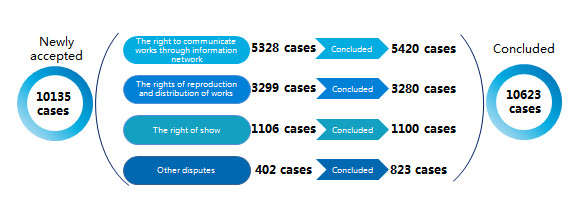
Fig. 9. The number of civil copyright cases of first-instance in Shandong courts in 2022
(IV) Maintaining Market Order for Fair Competition
Shandong courts attached equal importance to standardization and development, appropriately heard antitrust and anti-unfair competition cases in accordance with the law, severely punished acts that undermined fair competition or disrupted market order in accordance with the law, such as compulsory “exclusive dealing agreement” and “click farming and fraudulent credit speculation,”which improved enterprises’ awareness of fair competition, and guided the formation of a market environment that advocated, protected, and promoted fair competition. In 2022, Shandong courts newly accepted 1,157 anti-unfair competition cases and concluded 1,236 cases. Among them, there were 764 cases of counterfeiting, with 822 concluded; 283 cases of unfair network competition, with 308 concluded; 53 cases of trade secret, with 59 concluded; 29 cases of false propaganda, with 27 concluded; 28 other cases, with 20 concluded. In the case of commercial defamation of “Hisense” vs. “TCL,” Shandong High People’s Court punished the use of “short videos” in publicizing false and misleading information that damaged the reputation of competitors in accordance with the law, and raised the compensation amount from RMB 500,000 in the firstinstance judgment to RMB 2 million to regulate the use of “short videos” in brand promotion and cleanse the market competition environment. Inthe unfair competition case of dispute over “Click farming and fraudulent credit speculation” of Dianping.com, Qingdao Intellectual Property Tribunal severely punished the practice of unfair competition and the use of “click farming” to hype the reputation of network operators and to damage the legitimate rights and interests of platform operators and consumers, thus maintaining a market order of fair competition. The case was listed in the “Top 10 IP Cases of Chinese Courts.”
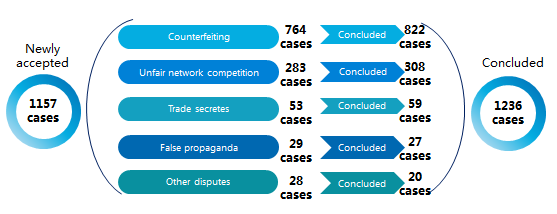
Fig. 10. The number of civilunfair competition cases of first-instance in Shandong courts in 2022
(V) Taking the Initiative in Serving the Policy of High Degree of Opening-up
Shandong courts equally protected the legitimate rights and interests of both domestic and foreign parties in accordance with the law tocreate an open, fair, equitable, and non-discriminatory environment forthe development of science and technology and amarket-oriented, world-class business environment governed by a sound legal framework. Through considering both domestic and external situationsin a coordinative way, the courts resolutely safeguardednational sovereignty, security, and development interests of China while promoting mutually beneficial international economic and trade cooperation. In 2022, Shandong courts newly accepted 469 civil cases of first-instance involving the intellectual property rights of foreign entities and entities in Hong Kong, Macao, and Taiwan, and concluded 457 cases. Among them, there were 275 cases involving foreign-related trademark rights, with 262concluded; and 150 cases involving foreign-related copyright, with 160concluded. In addition, 17 cases involving foreign-related patents were accepted, with 24 concluded. Cases involving foreign-related trademark rights concerned internationally renowned brands such as Prada, Louis Vuitton, The North Face, Nike, and Hennessy as well asother commodities such as clothing, perfume, and alcohol. In the case of dispute over trademark infringement and unfair competition of“MicroEssentials”, despite the infringer’s rejection to submit the books of accounts, Shandong High People’s Court fully supported the right holder’s claim for compensation of more than RMB10 million based on the fact that the infringer had an all-round free-ride on the right holder’s business reputation to commit long-term infringement, thus attracting severe punishment for infringement as per law. The case was listed in the “50 Typical IP Cases of Chinese Courts.”
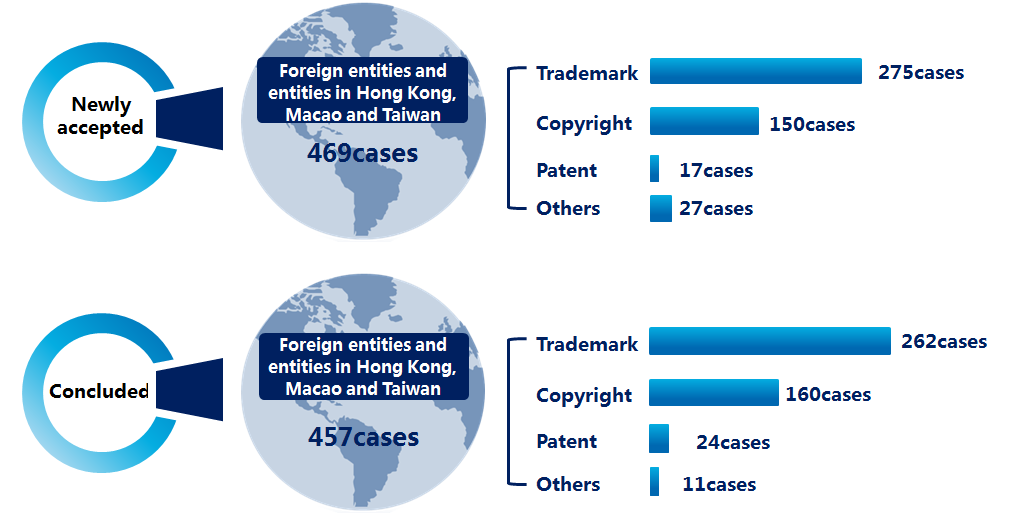
Fig. 11. The number of civil cases of first-instance involving intellectual property rights of foreign entitiesand entities in Hong Kong, Macao, and Taiwan in Shandong courts in 2022
III. Deepening Institutional and Mechanism Innovation to Promote the Modernization of the Trial Systemand Judicial Capacity
Shandong courts robustly promoted the spirit of the timeswith respect toreform and innovation, focused on deepening of reform and technology empowerment as driving forces for the modernization of the trial system and judicial capacity and strove to improve the capacity and level of judicial protection for intellectual property rights.
(I)Strictly Implementing the Punitive Damages System
General Secretary Xi Jinping has placed immense impetus on punitive damages for intellectual property rights and has mentioned several times that punitive damages should be applied in intellectual property rights protection. The General Office of the CPC Shandong Provincial Committee and that of Shandong Provincial People’s Government proposed to apply the principle of intellectual property compensation in a precise manner and to increase punitive damages in theImplementation Opinions on Implementing the Several Issues Concerning the Advancement of Reform and Innovation in Intellectual Property Trials. To implement the decisions made by the CPC Central Committee and the work plans made by the CPC Shandong Provincial Committee and to precisely apply theInterpretation on the Application of Punitive Damages in the Trial of Civil Cases Involving Intellectual Property Infringement, Shandong High People’s Court took the lead among Chinese courts in formulating and publishing theGuidelines for the Application of Punitive Damages in the Trial of Civil Cases Involving Intellectual Property Infringement. By doing so, the Courtrefined the standards for the application of punitive damages for intellectual property rights, clarified the overall requirements and specific measures for the application of punitive damages in civil cases of intellectual property infringement, and robustly enhanced judicial protection for intellectual property rights in Shandong Province—this was published on the front page of the People’s Court Dailyas a special report. To guide Shandong courts in handling relevant cases, Shandong High People’s Court issued theInstructions on the Application of Punitive Damages in the Trial of Civil Cases Involving Intellectual Property Infringementto explain in detail the background, grounds, and specific application measures of the judgment guideline, which was published in Reference to Intellectual Property Trial.
(II) Optimizing the Pattern of Intellectual Property Trials
In 2022, with the approval of the Supreme People’s Court, 20 grassroots courts with jurisdiction over civil and administrative intellectual property cases were established in Shandong Province, taking the number of grassroots courts with intellectual property jurisdiction to 41. Shandong courts have continued to consolidate the establishment of circuit courts of intellectual property trials in key development zones (parks). Qingdao Intermediate People’s Court successively established the Intellectual PropertyCircuit Court at Yantai Intellectual Property Protection Center and the Intellectual Property Circuit Workstation at Laixi-Laiyang Integrated Development Pilot Zone; Binzhou Intermediate People’s Court set up the High-tech Area Intellectual PropertyCircuit Court; Liaocheng Intermediate People’s Court built the Intellectual Property Circuit Court of the Economic and Technological Development Zone; and Heze Intermediate People’s Court established Caoxian County Intellectual Property Circuit Court. With the establishment of a “1+2+15+41” pattern of courts for intellectual property trials where the Intellectual Property Division of Shandong High People’s Court plays a leading role, the 2 intellectual property tribunals of Ji’nan and Qingdao serve as models,the intellectual property divisions of the 15 intermediate courts serve as the central point, and the 41 grassroots courts serve as pillars, together with 21 intellectual property circuit courts set up in key development zones (parks), the intellectual property jurisdiction arrangementwas further optimized and the intellectual property trial system was further improved.
(III) Deepening the Reform of the “Three-in-One” Mechanism for Intellectual Property Trials
Based on the Implementation Plan for Comprehensively Promoting the“Three-in-One” Trial of Intellectual Property Cases of Shandong High People’s Court, the reform of the “Three-in-One” mechanism for intellectual property trials was carried out in an orderly manner at three levels of courts in Shandong. In 2022, intermediate courts of Yantai, Zibo, Zaozhuang, Tai’an, Rizhao, Binzhou, and Heze either developed implementation plans for the reform that were in line with local judicial practices, or jointly signed cooperation framework agreements with the municipal public security bureaus and the municipal procuratorates to build and improve a case jurisdiction system and a work coordination mechanism based on the reform. The reform was fully achieved in intermediate and grassroots courts of Qingdao, Dongying, and Weihai and was realized in the intermediate courts of Jinan, Weifang, Jining, Dezhou, and Heze. There was improved coordination among civil, administrative, and criminal litigation procedures for intellectual property rights, and the quality and efficiency of intellectual property trials were further improved. Significant achievements were made in the substantive promotion of the reform in courts across Shandong Province.
(IV)Enhancing the Development of Intellectual Property Tribunals
The establishment of intellectual property tribunals is a novel move of the national trial system for judicial protection in technology-related intellectual property cases. Shandong High People’s Court strongly supported the pilot work of the Intellectual Property Court of the Supreme People’s Court. In 2022, Shandong High People’s Court sent two outstanding judges and two judge assistants to the Intellectual Property Court of the Supreme People’s Court on a study and practice tour. Shandong courts cumulatively sent 11 judges and judge assistants to the Supreme People’s Court, where they proactively participated in the pilot evaluation forum of the Intellectual Property Court and gave suggestions on improving the appeal hearing mechanism for intellectual property cases at the national level according to the work plan of the Supreme People’s Court. In 2022, Shandong High People’s Court was commended by the Supreme People’s Court as a “Collective with Outstanding Performance in Pilot Work of Intellectual Property Courts.”
The Ji’nan and Qingdao intellectual property tribunals are important components of the national specialized trial system for technology-related intellectual property cases. After their establishment, the two tribunals played a significant leading and driving role in the development of Shandong’s intellectual property trials, effectively served and guaranteed the national innovation-driven development strategy and contributed toward making Shandong a province with strong intellectual property rights. In 2022, the two tribunals accepted 9,283 intellectual property cases of first-instance, second-instance, and petitions for retrial, with 9,557 Cases concluded, accounting for 40% of the total number of intellectual property cases in Shandong. Several cases were rated as typical cases by the Supreme People’s Court. Ji’nan Intellectual Property Tribunal conducted research on judicial protection of new plant varieties and published a research report titled Take the Initiative to Build a Large-scale Protection Framework to Promote Innovative Development of the Modern Seed Industry. Qingdao Intellectual Property Tribunal fully capitalized on its advantages in cross-regional jurisdiction, signed cross-regional cooperation agreements on intellectual property rights protection with Weihai and Weifang intermediate courts and market administrations, and hosted the Jiaodong Peninsula Work Exchange Conference of Coordinated Judicial and Administrative Protection for Intellectual Property to promote integrated protection in the Jiaodong economic zone. Based on the work plan for “building an international, innovative city,” members of the Qingdao Intellectual Property Tribunal also visited and conducted research on new industries such as integrated circuits and bio-pharmaceuticals, with the aim to develop a better understanding of the judicial needs of enterprises, so as to provide precise judicial services.
(V) Advancing the Development of a Technical Investigation Talent Pool
Shandong High People’s Court directed Ji’nan Intellectual Property Tribunal and Qingdao Intellectual Property Tribunal to publish administrative measures and implementation rules for technical advisory experts, investigators, and expert jurors based on the relevant provisions for technical investigators of the Supreme People’s Court, to standardize the engagement of experts in litigation work. This gave full play to the role of intellectual property judicial protection expert think tanks and effectively enhanced technical fact-ascertaining in intellectual property cases. Qingdao Intellectual Property Tribunal completed the selection and appointment of the second batch of technical consulting experts and investigators, promulgated the Interim Measures for the Engagement of Technical Investigators in Litigation Activities, and the Articles of Association of the Expert Consulting Committee, and appointed 28 technical investigators and 54 technical consulting experts to assist judges in accurately comprehending and efficiently clarifying professional and technical issues. Cumulatively, the two tribunals heard 59 cases where they were assisted by the technical investigators and expert jurors, and gradually standardized the engagement of technical experts in litigation activities such as court hearings, inquests, and evidence preservation. Shandong High People’s Court plans to build a technical investigation talent pool of Shandong courts, which will be integrated with the Technical Investigation Talent Pool of Chinese Courts of the Supreme People’s Court, improve the mechanism for sharing technical investigation talent resources, and build a mechanism to link with the dispatch of technical investigation resources by the Supreme People’s Court.
(VI) Deepening the Development of Smart Courts
Shandong courts conscientiously advanced the in-depth integration of information technology with judicial work, and proactively promoted the in-depth judicial application of modern technologies such as the internet, AI, and big data in the judicial field to comprehensively integrate information and intellectual property trials. They further improved the in-depth application of the intellectual property case and judgment document database and strenuously advanced the development of a precise case rule bank by comprehensively utilizing theZhiji Zhibiadjudication rules databases of the Supreme People’s Courts, which is aimed at enhancing the courts’ understanding of their own cases and those of other courts. A total of 179 intellectual property cases were included in the case rule bank in 2022. Shandong courts completed the development of elemental modules for cases involving infringement of intellectual property rights, including trademark rights, information network dissemination rights, and work distribution rights based on the work plan for the promotion and application of Shandong Smart Court 4.0 case trial module system, which promoted the unification of the judgment standards. The standardization of internet trials was achieved with the internet trial rate of intellectual property cases in Shandong High People’s Court reaching 93.56%. Documents related to intellectual property cases of Shandong courts were delivered 24,273 times throughout the year, among which 23,978 deliveries were conducted electronically, with an electronic delivery rate of 98.8%. The Qingdao Intellectual Property Tribunal launched a cross-domain asynchronous cross-examination system for the parties to a litigation to upload electronic evidence online, which enhanced the convenience and efficiency of the pre-trial procedure—the system was promoted nationwide by the Supreme People’s Court. The courts continued to deepen and enhance the application of the Intelligent 3D Evidence Management System, introduced the Regulations on Intelligent 3D Evidence Management of Intellectual Property rights, and conducted modeling 832 times to ensure the standardization of the system and make it more organized. Ji’nan Intellectual Property Tribunal issued the Specifications on Intelligent 3D Evidence Management of Intellectual Property Trials and conducted modeling 630 times.
IV.Collaborative Efforts to Develop a Large-scale Intellectual Property Protection Model
Shandong courts collaboratively worked with various social entities, strengthened coordination and cooperationamong all parties, proactively developed a large-scale intellectual property rights protectionmodel, and fostered an environment of rule of law, which values innovation and protects creativity.
(I)Strengthening Coordination of Administrative Support and Judicial Protection for Intellectual Property Rights
Shandong courts were comprehensively involved in the development of the intellectual property rights protection system, strengthened communication and coordination with administrative intellectual property authorities, and participated in the development of local regulations and policies such as the Shandong provincial regulations on intellectual property rights protection and promotion, the outline for building a strong province with intellectual property rights, and the outline for quality strong province construction. The Shandong High People’s Court and the Department of Science & Technology of Shandong Province signed the Framework Agreement on Promoting Collaboration in Scientific and Technological Innovation in Accordance with the Lawto accelerate the integration of science and technology into the rule of law and to promote the development of scientific and technological innovation. The Shandong High People’s Court collaboratively formulated the Implementation Opinions on Consolidating the Cooperationbetween Antitrust Administrative Law Enforcement and JudicialEngagementwith the Shandong Administration for Market Regulation and People’s Procuratorate of Shandong Provinceand established a joint antitrust force. It collaboratively published the Top 10 Copyright Protection Cases in Shandong Province with Shandong Copyright Bureau, to reinforce the multi-dimensional protection for copyrights. Furthermore, it held work exchange forums on judicial protection of intellectual property rights together with the People’s Procuratorate of Shandong Province to promote cooperation and engagement through the “three-in-one” mechanism for intellectual property trials. It also established a long-term exchange and cooperation mechanism with the Shandong Provincial Department of Agriculture and Rural Affairs to encourage breeding innovation and to ensure technologicalself-relianceinthe seed industry. The Zibo Intermediate People’s Court partnered with the Zibo Administration for Market Supervision in compiling the Guidelines on Judicial Protection for Intellectual Property Rights,to create a favorable social atmosphere for innovation protection.
(II)Improving Diversified Dispute Resolution Mechanisms
Shandong courts focused on improving the ability of people’s courts in resolving conflicts and disputes in the new era, effectively prioritized the application of non-litigation dispute resolution mechanisms, comprehensively leveraged the role of people’s courts as mediation platforms and are playing an active role in social governance innovation. The intermediate courts of Zaozhuang, Yantai, Weifang, Tai’an, Binzhou, Dezhou, Liaocheng, Linyi, and Heze, as well as the grassroots courts of counties or districts such as Lixia and Zhangqiu districts of Ji’nan, Shinan District and Jiaozhou County of Qingdao, Zhoucun District of Zibo, Linqing County of Liaocheng, and Dongming County of Heze, held discussions with other regulatory authorities including local market supervision and administration bureaus, cultural and tourism bureaus, the department of justice, and arbitration commissions, and jointly published theOpinions on Establishing a Litigation and Mediation Linkage Mechanism for Intellectual Property Disputesand the Implementation Measures for Judicial Confirmation of Administrative Mediation Agreements for Intellectual Property Cases.They strengthened the intellectual property mediator team and enhanced their training,and established the intellectual property pre-litigation mediation modes for separate mediation by market supervision, administration bureaus, arbitration commissions, and the court-basedpeople’s mediators selected and appointed by the judicial bureaus,with the courts providing guidance for intellectual property cases, thereby ensuring convenient and efficient dispute resolution for the parties involved in the cases. They comprehensivelycarried forwardthe institutionalization and standardization of administrative mediation and judicial confirmation to promote fair and efficient resolution of intellectual property disputes according to law. “Administrative mediation + judicial confirmation” is an important measure for intellectual property right protection, which can not only comprehensively enhance the efficiency and effectiveness of dispute resolution through mediation by administrative organs but also endow more powerful legal effects to intellectual property dispute mediation agreements toguarantee the fulfillment of mediation agreements in accordance with the law. In 2022, Shandong courts resolved 146 intellectual property cases through judicial confirmation via administrative mediation
(III) Strengthening Judicial Exchanges on Intellectual Property Rights
The Shandong High People’s Court was invited to attend the 3rd Qingdao Multinationals Summit,where representatives of the Court delivered a keynote speech titled Strengthening Judicial Protection for Intellectual Property Rights and Creating a Market-oriented and Internationalized Business Environment under the Rule of Law in an All-round Manner. Representing the provincial-level political and legal system of Shandong, the Shandong High People’s Courtattended the press conference conducted by the Information Office of Shandong Provincial People’s Government on the outline of building Shandong into a province with powerful intellectual property rights, where the Court introduced the related achievements and contributions made by Shandong courts.Representatives of Ji’nan Intermediate People’s Court gave a speech on a typical case at the National Video Conference on Protecting Intellectual Property Rights of the Seed Industry and Cracking down on Counterfeiting and Trademark Infringement on behalf of the Chinese court system, and shared Shandong’s experiences and practices in offering judicial protection for the seed industry. Shandong courts took the initiative to introduce intellectual property rights protection into enterprises, units, communities, and schools, appointed judges to deliver lectures on judicial protection for intellectual property rights in universities and held discussions on literature and art copyright protection in the new media era at the invitation of Shandong Federation of Literary and Art Circles. Binzhou Intermediate People’s Court signed the FrameworkCooperation Agreement on Theoretical and Practical Research in Intellectual Property Rights with Binzhou Polytechnic to collaboratively build the Theoretical Research Base for Intellectual Property Protection and theBase for Intellectual Property Education, Research, and Practice.
(IV) Enhancing the Publicity of Intellectual Property Rights under the Rule of Law
Shandong High People’s Court has organized the publicity campaign of “World Intellectual Property Dayon April 26” for 21 consecutive years. The courts held press conferences and released theIntellectual Property Protection by Shandong Courts in 2021 (Chinese and English versions) andTop 10 typical IP cases of Shandong Courts in 2021. It has now become routine for Shandong courts to publicize information in both Chinese and English on intellectual property rights judicial disclosure. The courts organized and carried out the Civil Code “5 A-hundred” campaign,all of the judges, court staff and judicial personnel actively participated in the campaign. The Shandong courts recommended excellent intellectual property judgment documents, typical cases, and live broadcasts of court trials,and produced short videos of “Judges expoundon the Civil Code” to create a sound legal atmosphere for everyone to learn, use, and abide by the Civil Code. All the intermediate courts in Shandong conscientiously organized and carried out the “World Intellectual Property Day on April 26” campaign, and published a white paper on judicial protection for intellectual property rights and selected the top ten cases of judicial protection for intellectual property rights of the year, to publicize relevant achievements. They invited representatives of the National People’ Congress and members of the Chinese People’s Political Consultative Committee to attend typical case trials, to publicly demonstrate fairness and to continuously improve judicial credibility. The Ji’nan Intellectual Property Tribunal held a publicity forum on the business environment for high-tech enterprises in the “Internet+” Innovation and Entrepreneurship Comprehensive Demonstration Park. The Qingdao Intellectual Property Tribunal and Qingdao Lawyers Association held a seminar on the application of punitive damages for intellectual property cases. The intermediate courts of Ji’nan, Qingdao, Zibo, Dongying, Tai’an, Weihai, Dezhou, Liaocheng, and Linyi, as well as the grassroots courts of Zhangqiu District of Ji’nan, Jimo District and Jiaozhou County of Qingdao, Zhoucun District of Zibo, and Zhaoyuan County of Yantai, actively offered enterprises services such as legal advice, information exchanges, pre-litigation mediation, and dispute early warningof their own accord, to support the innovative development of the enterprises.
V. Enhancing Investigation and Research Guidance to Improve the Quality, Efficiency, and Effectiveness of Trials through Targeted Efforts
Shandong courts adhered to the problem-oriented approach, took the responsibility and focused on discovering and solving problems through investigation and research in daily work. The courts strengthened their guidance on trials, and consistently improved the quality, efficiency, and effectiveness of intellectual property trials.
(I) Strengthening Investigation and Research
Bearing in mind the actual situation of intellectual property trial work in Shandong, the Shandong High People’s Court played its due role as the leader in promoting investigation and research. It collaborated with Shandong Intellectual Property Research Institute and Law School of Yantai University in studying issues related to punitive damages, and held seminars on difficult issues related to punitive damages for intellectual property rights. Together, they published the over 40,000-word Research Report on the System of Punitive Damages for Infringement of Intellectual Property Rightsbased on extensive investigation and research, laying a solid foundation for the formulation and release of follow-up judgment guidelines. After the jurisdiction of intellectual property cases was adjusted, Shandong High People’s Court worked together with intermediate and grassroots courts of Weifang in conducting investigation and research with the aim to accurately discover facts and resolve disputes in the firstinstance, effectively finalize and accurately resolve disputes in the secondinstance, and correct errors in accordance with the law and unify the judgment standards in retrials.Finally, they formulated a report titledResearch on Dispute Resolution of Trademark Infringement Cases, to provide effective guidance on handling this type of cases in Shandong. The Ji’nan Intellectual Property Tribunal formulated theOpinions on Strengthening Judicial Protection for Intellectual Property Rights to Serve and Guarantee Environment Improvement and Innovation-driven Development,to facilitate innovative economic and social development. The Qingdao Intellectual Property Tribunal also published theResearch Report on Judicial Protection for Intellectual Property Rights in the Marine Bio-pharmaceutical Industryand theResearch Report on Judicial Protection for Intellectual Property Rights in the Integrated Circuit Industry.The Tribunal was duly informed of the need of judicial protection in new fields and businesses and gave judicial advice to Qingdao Bureau of Commerce and Qingdao Administration for Market Regulation on problems related to franchise cases, to ensure the standardized and healthy growth of the franchise industry. The Dongying Intermediate People’s Court compiled the Six Measures for Supporting High-quality Development of the Agricultural High and New Technology Industry Demonstration Area in the Yellow River Delta to support the agricultural high and new technology industry. The Binzhou Intermediate People’s Court developed theImplementation Opinions on Strengthening Judicial Protection for Intellectual Property Rights and Promoting the Construction of a Rule of Law Environmentto foster law-based business environment.
(II) Reinforcing Trial Guidance
At the beginning of the year, the Shandong High People’s Court formulated the Key Points of Intellectual Property Trialsin 2022, which specified the missions and major tasks of the year, and was issued to all courts of Shandong Province. It built a provincial-level intellectual property trial work guidance and exchange platform, compiled and issued theReferences To Shandong Intellectual Property Trialsevery two months, which published the latest judicial interpretations and policies and typical cases of the Supreme People’s Court, as well as Shandong courts’ experience and practices in judicial protection for intellectual property rights, and consistently expanded the channels for trial guidance. Based on the analysis of thefirst-instance cases in Shandong and the reasons for the revision of judgments in the second-instance cases, it published the Analysis Report on Operation Status of the First-instance Intellectual Property Cases of Shandong Courts in 2021 and theAnalysis Report on the Reversal of the Second-instance Intellectual Property Cases and Typical Cases of Shandong High People’s Court in 2021, where the problems with the hearing of the first and second instances of intellectual property cases in Shandong courts were sorted out, and the judgment standards were unified. When it came to issues like developing an accurate understanding of the standards for identifying works, regulating the amount of damages for infringement on emoticon art works, and determining civil liabilities in cases where the rights holder filed appeals against multiple sellers and the same manufacturer independently, Shandong High People’s Court formulated rules of study and judgment in a timely manner and enhancedits guidance to the courts throughout Shandong. The Ji’nan Intellectual Property Tribunal held a training session on the analysis of the development and reform of second-instance intellectual property cases in Ji’nan courts. The Qingdao Intellectual Property Tribunal held a symposium on the jurisdiction adjustment of intellectual property cases in Qingdao. The Zibo Intermediate People’s Court studied and formulated theTroubleshooting the Application of Law in Intellectual Property Cases document.The Linyi Intermediate People’s Court developed a working method for solving 20 problems under 5 aspects, including standard identification for cases of the same type, document delivery, effectiveness of notarial documents, which unified the judgment scale of the grassroots courts and improved the professionalism of both intermediate and grassroots courts.
VI. Increased Team Building Efforts to Improve Service and Guarantee Capabilities
Shandong courts strictlyadhered to Party Building in order to promote team building and trials. The courts comprehensively strengthened the team construction to be more revolutionary, standardized, specialized,and professionally more competent. And by combining political, professional, and ethical quality improvements, the courts endeavored to forge an IP trial team that was political committed, cognizant of the broader context, well-versed in the law, knowledgeable about technology, and with an international perspective.
(I)Strengthening Political Guidance
Guided by Xi Jinping Thought on Socialism with Chinese Characteristics for a New Era, Shandong courts strictly adhered to the guidance of Xi Jinping Thought on the Rule of Law to guarantee that administration of justice for intellectual property progressed in the right direction. Shandong courts took the study, publicity and implementation of the guiding principles of the 20th CPC National Congress as the primary political task, tookthe initiative to increase participation in learning activities such ascentralized training, themed discussions, and knowledge tests, comprehensively utilizedplatforms such as Xuexi.cn and Dtdjzx.gov.cn for online learning, and aligned police ideology with the guidelines of the 20th CPC National Congress. Promoting the administration of justice through team building driven by Party building, the Intellectual Property Division of Shandong High People’s Court organized collective learning sessions at least 4 times a month and proactively carried out featured theme Party Day activities. It also gave full play to the role of the youth theory learning group, which put forward the research report titled Giving Play to the Role of Trials to Serve and Promote the Implementation of Exploring New Ground in 10 Areas.The team also actively carried out intellectual property-themed collaborative youth theory learning activities. The Qingdao Intellectual Property Tribunal organized activities such as the Intellectual Property and Youth Symposium on “Building the Future with Innovation” and “Celebrating the Birthday of the Motherland and the Fifth Anniversary of the Court’s Establishment,” to promote the deep integration of party building and trial.
(II)Improving Professional Capabilities
Shandong courts put in immense efforts to enhance the professional training for intellectual property judges. Shandong High People’s Court held “online+offline” training courses on intellectual property trial practice for Shandong courts, and invited several senior judges from the Supreme People’s Court to give lectures. It also conscientiously organizedand participated in the “New Knowledge Lecture Hall” training activity held by the Supreme People’s Court, selectedtwo grassroots judges to participate in the same-class special training seminar “Difficult and Complicated Issues in Handling Intellectual Property Cases” at the National Judges College, strengthened the learning of judicial practices, and invited judicial experts throughout China to deliver lectures on judicial practices and essay writing. The intermediate courts of Ji’nan, Qingdao, and Heze placed a lot of impetus on improving the administration of justice for intellectual property rights by holding relevant training in cities. In 2022, two intellectual property judges were awarded the title “Excellent Judges in Shandong” by Shandong Human Resources and Social Security Department. Five intellectual property judges were awarded the title “Experts of Administration of Justice in Shandong.”
(III) Refining Professional Ethics
Shandong courts comprehensively practiced the principle of justice for the people, adhered to judicial justice, and carefully fulfilled their responsibilities and missions of maintaining national political security. They ensured social stability, promoted social fairness and justice, guaranteed people's ability to live and work in peace and contentment, focused onthe most pressing difficulties of high concern to the people, and effectively strengthened judicial protection for people’s livelihoods. The courts implemented the “Ten Prohibitions” on political, legal, and police officers in the new era, promoted the refined traditions of the people’s judiciary, innovated means of warning and education, and implemented strict regulations and prohibitions such as the “three regulations.”They made good use of the “four forms” of oversight over discipline compliance, and promoted the development of a system and mechanism in which the judicial officials do not dare, are not able, and ultimately have no desire to be corrupt.
Conclusion
The year 2023 is bearing witness to the start of the comprehensive implementation of the spirit of the 20th CPC National Congress. It is also a crucial year connecting the preceding and the following years in the implementation of the “14th Five-Year Plan.” Shandong courts will rally even closer around the Party Central Committee with Comrade Xi Jinping at its coreand be guided by Xi Jinping Thought on Socialism with Chinese Characteristics for a New Era. Shandong courts will carry forward the guidance of Xi Jinping Thought on Rule of Law, adhere to stress political awareness, enhance overall situation consciousness, promote justice, improve efficiency, emphasize self-discipline, strengthen capacity building, and serve the overall interests of the country with judicial services. Shandong courts will adhere to the unity of fairness and efficiency, consistently bear in mind the concept that protecting intellectual property rights is protecting innovation, and comprehensively deepen reform and innovation in intellectual property trials, solidly carry out the theme education on the study and implementation ofXi Jinping Thought on Socialism with Chinese Characteristics for a New Era, so as to bring out the functions of intellectual property trials, improve the quality, efficiency, and effectiveness of intellectual property trialscomprehensively, and promote the high-quality development of intellectual property adjudication. These efforts will enable the courts to offer reliable judicial services and guarantees to build Shandong into a province withpowerful intellectual property rights.
2022年山东法院十大知识产权案件
4月21日上午,山东高院召开知识产权宣传周新闻发布会,通报了2022年山东法院十大知识产权案件。
1.“短视频”商业诋毁案
原告:海信视像科技股份有限公司(简称海信公司)
被告:TCL王牌电器(惠州)有限公司(简称TCL惠州公司)等
【案情摘要】海信激光电视主机外观及“海小聚”卡通形象通过海信公司的宣传使用,成为识别海信公司激光电视的重要标识。TCL惠州公司在其官方微博、抖音帐号上发布了短视频,视频内容系对一款激光电视显示效果、噪音及漏光等方面的评论,认为该激光电视存在观看角度小、漏光及噪音大等缺陷,并将该激光电视与TCL电视进行了优劣对比,宣称TCL电视为100分。该激光电视画面中显示有海信激光电视外观及“海小聚”卡通形象。海信公司认为TCL惠州公司的上述行为构成商业诋毁,请求法院判令TCL惠州公司停止侵权、赔偿经济损失并消除影响。诉讼过程中,被诉侵权视频已删除。
法院经审理认为,TCL惠州公司发布的被诉侵权视频中的电视外观及“海小聚”卡通形象能够指向海信公司,TCL惠州公司通过对比、夸大、贬损等方式对海信激光电视进行了引人误解的描述,足以导致消费者对海信公司的激光电视质量产生否定性评价,损害了海信公司的商业信誉和商品声誉,TCL惠州公司的行为构成对海信公司的商业诋毁。法院判决TCL惠州公司赔偿经济损失200万元并消除影响。
【典型意义】本案系以“短视频”形式实施商业诋毁的新类型不正当竞争案件。虽然商业诋毁行为中未明确体现被诋毁对象的企业名称,但通过诋毁内容能够确定被诋毁对象的,仍然能够认定商业诋毁行为成立。本案的裁判,通过对隐蔽商业诋毁行为的准确认定,对微博、抖音“短视频”新兴宣传模式加以规范,维护了经营者利用新媒体进行广告宣传的公平竞争秩序。
一审法院审判人员:法官郭静、法官石利华、人民陪审员朱世玲,法官助理姜杨,书记员孔帅、殷圣芳。
二审法院审判人员:法官刘晓华、法官柳维敏、法官张金柱,法官助理张甜,书记员刘霞。
2.“伟科609”玉米植物新品种侵权案
原告:河南金苑种业股份有限公司(简称金苑公司)
被告:青岛鑫丰种业有限公司(简称鑫丰公司)
被告:山东省德发种业科技有限公司(简称德发公司)
【案情摘要】金苑公司系“伟科609”玉米植物新品种权人。山东省平度市综合行政执法局(简称平度执法局)执法检查发现鑫丰公司销售的玉米种子并非标注的“豫禾868”,属于假种子,对鑫丰公司作出行政处罚决定。金苑公司认为鑫丰公司销售的“豫禾868”实际是“伟科609”,德发公司生产销售了“豫禾868”,两公司的行为侵害了“伟科609”玉米植物新品种权,请求法院判令鑫丰公司、德发公司停止侵权并赔偿经济损失。
法院经审理认为,平度执法局依法查扣鑫丰公司销售的“豫禾868”玉米繁殖材料经鉴定与“伟科609”构成近似品种,德发公司和鑫丰公司的行为侵害了涉案品种权。鑫丰公司销售的“豫禾868”有合法来源,德发公司拒绝提供其生产销售侵权品种繁殖材料的数量,综合考虑侵权性质、期间、销售范围等因素,法院判决德发公司、鑫丰公司停止侵权,德发公司赔偿经济损失40万元。
【典型意义】本案系行政保护与司法保护有效衔接、优势互补的典型案件。本案通过行政机关的先行查处,既有效制止侵权行为并防止权利人损失扩大,又能及时固定侵权证据,便于后期诉讼中通过司法鉴定确定同一性,准确认定侵权行为。本案的裁判,充分体现出行政查处的及时高效与司法审判的定分止争相辅相成,有效支持了行政机关依法履职,有利于形成行政和司法保护合力。本案入选“人民法院种业知识产权司法保护典型案例”。
一审法院审判人员:法官石利华、人民陪审员厉澄、人民陪审员张旗,法官助理姜杨,书记员王蕾、国莹莹。
二审法院审判人员:法官邓卓、法官张新锋、法官徐飞,法官助理谢蓉,书记员张远思。
3.“环球”商标侵权案
原告:烟台环球机床装备股份有限公司(简称环球公司)
被告:呼和浩特众环(集团)有限责任公司(简称众环公司)等
【案情摘要】环球公司系“环球”商标权人,该商标系烟台机床附件厂于1958年注册,后根据商标法于1984年续展注册,经多次续展、转让,环球公司受让成为“环球”商标权人。“环球”商标权人持续许可众环公司在卡盘商品上使用“环球”商标至2019年12月2日。许可到期后,众环公司仍然继续使用“环球”商标。环球公司认为众环公司的上述行为侵害其“环球”商标权,请求法院判令众环公司停止侵权并赔偿经济损失。
法院经审理认为,虽然“环球”商标由烟台机床附件厂1958年注册后,权利人几经变更,但持续使用至今,“环球”商标权益一直延续。根据商标法规定,商标法施行前已经注册的商标继续有效。涉案商标申请注册日应为1958年。众环公司未能提交有效证据证明其在1958年之前使用过涉案商标,其在先使用抗辩不能成立。众环公司在商标使用许可到期后仍然继续使用的行为侵害了“环球”商标权。法院判决众环公司停止侵权并赔偿经济损失。
【典型意义】本案系依法认定商标法施行前注册商标权利有效期间的新类型商标侵权案件。商标法施行前已经注册的商标继续有效,只要该商标持续使用,并在商标法施行后续展注册,该商标权益一直延续,亦不受商标权人变更的影响,并且该商标申请注册日应为商标法施行前商标注册人申请注册商标之日。本案的裁判,通过对商标法施行前注册商标权利的延伸保护,全面保护了商标权人的合法权益,体现了加大知识产权保护力度的司法导向。
一审法院审判人员:法官于兰、人民陪审员张少棠、人民陪审员迟荣庚,书记员滕欣宇。
二审法院审判人员:法官于志涛、法官柳维敏、法官张金柱,法官助理赵有芹,书记员闫旭冉。
4.“肛泰”商标侵权案
原告:烟台荣昌制药股份有限公司(简称荣昌公司)
被告:延安市宝塔区温王医药科技有限公司(简称温王公司)
被告:桂林极致医药科技有限公司(简称极致公司)
被告:徐某泽等
【案情摘要】荣昌公司系“肛泰”“”商标权人。温王公司、极致公司在其生产销售的被诉侵权药品上使用了“肛泰”及小红人标识,徐某泽系极致公司的监事及股东。荣昌公司认为温王公司、极致公司、徐某泽共同实施了侵权行为,应共同承担赔偿责任,请求法院判令温王公司、极致公司停止侵权,徐某泽与温王公司、极致公司共同赔偿经济损失100万元。
法院经审理认为,极致公司成立后,徐某泽作为法定代表人的案外人金典公司委托温王公司生产痔得肛泰商品,但其外包装仿冒荣昌公司生产的荣昌肛泰小红人等外包装,被行政处罚;徐某泽还申请了“包装盒(肛泰七)”外观设计专利,被诉侵权药品上使用的包装装潢与上述外观设计专利基本相同,且均含有被诉标识;徐某泽还称其创作了“调皮小孩”形象,但创作时间在涉案商标注册之后,且该形象与被诉小红人标识基本一致。综合上述事实,徐某泽系与温王公司、极致公司共同实施了被诉侵权行为,应共同承担赔偿责任。法院判决温王公司、极致公司停止侵权,徐某泽与温王公司、极致公司共同赔偿经济损失100万元。
【典型意义】本案系正确认定公司高管与公司构成共同侵权,全额支持权利人赔偿诉求的典型案件。法院明确了公司高管明知或应知其控制或管理的公司所实施的行为构成商标侵权,但仍然控制或管理公司实施上述行为的,公司高管与公司构成共同侵权。本案的裁判,对商标侵权案件中公司高管侵权行为的认定进行了有益探索,充分保护了商标权人的合法权益,对从源头上遏制侵权行为具有积极意义。
一审法院审判人员:法官王建梅、人民陪审员齐志玉、人民陪审员孙传玲,书记员王怡茜。
二审法院审判人员:法官于志涛、法官柳维敏、法官张金柱,法官助理马强,书记员邢晓宇。
5.“老板”商标侵权及不正当竞争案
原告:杭州老板电器股份有限公司(简称杭州老板公司)
被告:深圳高端厨卫老板电器有限公司(简称深圳老板公司)等
【案情摘要】杭州老板公司系“老板”商标权人。深圳老板公司在其生产销售的被诉侵权燃气灶等商品上使用“老板”标识,并将“老板”文字作为企业字号使用。杭州老板公司认为深圳老板公司上述行为侵害其涉案商标权并构成不正当竞争,请求法院判令深圳老板公司停止侵权并赔偿经济损失500万元。
法院经审理认为,深圳老板公司的被诉侵权行为侵害涉案商标权并构成不正当竞争,应承担停止侵权及赔偿损失的民事责任。关于赔偿数额,杭州老板公司主张根据深圳老板公司侵权获利计算赔偿数额,并提交了相关初步证据,而深圳老板公司拒不提供证明其侵权获利的财务账簿资料,法院根据相关证据记载的侵权商品销量、侵权持续时间及杭州老板公司年报公布的企业净利润率等信息,确定深圳老板公司侵权获利已超过杭州老板公司主张的数额。法院判令深圳老板公司停止侵权并赔偿经济损失500万元。
【典型意义】本案系精细计算赔偿数额,加大损害赔偿力度的典型案件。对权利人已经提供侵权人获利的初步证据,而侵权人无正当理由拒不提供真实账簿资料的,法院可以根据权利人的主张和提交的相关证据,通过分析侵权商品的单价、数量、利润等因素,精细计算侵权人获利。本案的裁判,有效运用举证妨碍规则强化了严格保护的法律效果,对破解“举证难”“赔偿低”等问题进行了有益探索。
二审法院审判人员:法官柳维敏、法官于志涛、法官张金柱,法官助理张琼,书记员丁艳奇。
6.“写真摄影作品”侵害信息网络传播权案
原告:小野杰西(厦门)服饰有限公司(简称杰西公司)
被告:烟台创源文化传媒有限公司(简称创源公司)
【案情摘要】杰西公司系摄影作品《爷爷瞬间年轻50岁写真系列4》的著作权人,其在微信公众号发表的文章中使用了上述摄影作品,该文章末尾用红色字体载明“转给你身边的每一位朋友”。创源公司在其微信公众号发表的文章中使用了杰西公司享有著作权的上述摄影作品。杰西公司认为创源公司的上述行为侵害其摄影作品信息网络传播权,请求法院判令创源公司停止侵权并赔偿经济损失。
法院经审理认为,杰西公司在涉案文章中载明“转”系希望通过他人转发行为使其微信公众号获得更多的流量关注,这种转发行为并不复制和传播信息本身,是对文章链接的分享。创源公司的行为则系转载,是对作品的复制传播,在未取得权利人许可的情况下,创源公司的行为侵害了涉案摄影作品信息网络传播权。法院判决创源公司停止侵权并赔偿经济损失。
【典型意义】本案系涉及微信公众号转载行为侵害信息网络传播权的典型案件。本案从权利人利益期待和互联网赢利模式的角度,对微信公众号文章权利人同意“转”的真实意图进行了准确分析。本案的裁判,厘清了“转发”和“转载”在信息网络传播中的不同法律性质,对净化网络空间,规范新媒体时代网络领域文化传播秩序具有积极意义。
一审法院审判人员:法官张文君,书记员田璐。
二审法院审判人员:法官陈辉,法官助理于娇娇,书记员王琪。
7.“制氧机”专利权权属案
原告:吴某刚
被告:山东美迪宇能医疗科技股份有限公司(简称美迪公司)
【案情摘要】吴某刚在美迪公司从事技术工作。吴某刚入职美迪公司时,双方约定“未来以吴某刚的技术申请的专利,公司和吴某刚共有”。后美迪公司取得“制氧机”外观设计专利权,设计人为吴某刚等。美迪公司认为涉案专利系吴某刚履行美迪公司工作任务的职务发明,美迪公司系涉案专利权人。吴某刚则认为根据其入职美迪公司时的约定,涉案专利权应为吴某刚与美迪公司共有,请求法院判令涉案专利权由吴某刚与美迪公司共有。
法院经审理认为,对当事人有争议的约定,应根据相关条款及约定目的确定意思表示的真实含义。吴某刚入职美迪公司时,表示其能够为美迪公司提供制氧机方面的技术资源,后吴某刚在美迪公司负责制氧机设计工作,美迪公司聘用吴某刚的目的即是使用其技术研发生产制氧机,“以吴某刚的技术申请的专利,双方共有”应理解为“以吴某刚提供的技术完成的职务发明创造申请的专利,由吴某刚与美迪公司共有”。法院判决确认“制氧机”外观设计专利权由吴某刚与美迪公司共有。
【典型意义】本案系保护创新主体合法权益的典型案件。发明人或者设计人可以与单位约定申请专利的权利和专利权的归属。本案的裁判,准确认定了单位提供的物质基础与技术人员智力劳动对技术成果形成所发挥的作用,对于激发人才创新活力,健全科技成果产权制度具有积极意义。
一审法院审判人员:法官刘念波、法官李玉、人民陪审员王红伟,法官助理白晓宽,书记员徐秋月。
二审法院审判人员:法官张金柱、法官于志涛、法官柳维敏,书记员邢晓宇。
8.“刷单炒信”行政处罚案
原告:山东华易网络技术开发有限公司(简称华易公司)
被告:潍坊市奎文区市场监督管理局(简称奎文市监局)
【案情摘要】案外人格瑞森公司向奎文市监局举报华易公司违法“刷单炒信”。经奎文市监局调查,华易公司与相关公司签订代运营协议,帮助运营淘宝店铺,组织刷单654笔,涉案款项75万余元。奎文市监局认为华易公司组织虚假交易,作出行政处罚决定,责令华易公司停止违法行为,并处罚款20万元。华易公司不服上述行政处罚决定,提起行政诉讼,请求法院判令撤销涉案行政处罚决定。
法院经审理认为,华易公司组织虚假交易违法行为事实清楚,奎文市监局作出行政处罚决定程序合法、适用法律正确,处罚幅度合理。法院判决驳回华易公司的诉讼请求。
【典型意义】本案系涉及“刷单炒信”的不正当竞争行政案件。“刷单炒信”不仅误导、欺骗消费者,损害广大消费者的合法权益,而且严重损害公平竞争的市场秩序。本案的裁判,通过依法支持行政行为,推动行政机关与司法机关形成合力,对于规范平台经济秩序,引导网络产业健康发展,优化公平竞争的营商环境具有积极意义。本案入选“‘山东法院这五年’推动法治进程典型案件”。
一审法院审判人员:法官崔心波、人民陪审员王宁波、人民陪审员王海英,法官助理玄园园,书记员马蕾。
二审法院审判人员:法官祝卫华、法官蔡霞、法官刘培玲,法官助理吴茂敏,书记员杨春雨。
9.“内置式打桩破碎锤”行政裁决案
原告:烟台劳卡精密机械有限公司(简称劳卡公司)
被告:烟台市市场监督管理局(简称烟台市监局)
第三人:烟台军恒工程机械设备有限公司(简称军恒公司)
【案情摘要】军恒公司系“一种新型内置式打桩破碎锤”实用新型专利权人。军恒公司因与劳卡公司存在专利侵权纠纷,请求烟台市监局处理。烟台市监局认为被诉技术方案落入涉案专利权保护范围,作出行政裁决,责令劳卡公司停止侵权并销毁侵权产品。劳卡公司不服上述行政裁决,提起行政诉讼,请求法院判令撤销涉案行政裁决。
法院经审理认为,涉案专利权利要求中对钎杆的限定是完全内置,而被诉产品一端在缸体外,只有一端在缸体内,被诉产品技术特征与涉案专利技术特征既不相同也不等同,被诉技术方案未落入涉案专利权保护范围。法院判决撤销烟台市监局作出的行政裁决。
【典型意义】本案系一起实用新型专利行政案件。本案通过对行政执法行为实体标准的司法审查,对行政执法行为进行了有效司法监督。本案的裁判,对于切实保障行政相对人合法权益,促进知识产权行政执法标准和司法裁判标准统一具有积极作用。
一审法院审判人员:法官纪晓昕、法官邢仁涛、法官李英三,法官助理宋福顺,书记员王蕾、殷圣芳。
10.“Haier”假冒注册商标罪、销售假冒注册商标的商品罪案
公诉机关:山东省青岛市即墨区人民检察院
被告人:孙某林、林某、张某祥、王某、苟某、刘某、王某红
【案情摘要】孙某林、林某、张某祥未经权利人许可,从王某处购买其生产的带有“Haier”注册商标的板材,非法生产带有“Haier”注册商标的橱柜。苟某、刘某、王某红未经权利人许可,从孙某林等人处购买假冒“Haier”注册商标的橱柜加价销售给他人。
法院经审理认为,孙某林、林某、张某祥、王某的行为均构成假冒注册商标罪,苟某、刘某、王某红的行为均构成销售假冒注册商标的商品罪,判处孙某林有期徒刑四年,并处罚金一百七十万元;判处林某有期徒刑四年,并处罚金一百七十万元;判处王某有期徒刑三年,并处罚金八十万元;判处张某祥有期徒刑三年,缓刑三年,并处罚金一百二十万元;判处苟某有期徒刑三年,缓刑三年,并处罚金十万元;判处刘某有期徒刑一年,缓刑一年,并处罚金五万元;判处王某红有期徒刑六个月,缓刑一年,并处罚金七万元。
【典型意义】本案系对侵犯知识产权的被告人判处有期徒刑并处罚金的刑事案件。本案的裁判,综合运用主刑和附加刑,不仅对假冒注册商标的被告人判处有期徒刑予以严惩,同时从经济层面施以重罚,有力震慑了侵犯知识产权的犯罪行为,是山东法院知识产权案件“三合一”审判机制改革的生动实践。
一审法院审判人员:法官张涛、人民陪审员刘成爱、人民陪审员秦作满,书记员卢敏。
二审法院审判人员:法官刘圣林、法官徐友仁、法官王燕,法官助理王冠宇,书记员许郑楠。
山东法院种业知识产权司法保护典型案例
4月21日上午,山东高院召开知识产权宣传周新闻发布会,通报了山东法院种业知识产权司法保护典型案例。
1.“伟科609”玉米植物新品种侵权案
原告:河南金苑种业股份有限公司(简称金苑公司)
被告:青岛鑫丰种业有限公司(简称鑫丰公司)
被告:山东省德发种业科技有限公司(简称德发公司)
【案情摘要】金苑公司系“伟科609”玉米植物新品种权人。山东省平度市综合行政执法局(简称平度执法局)执法检查发现鑫丰公司销售的玉米种子并非标注的“豫禾868”,属于假种子,对鑫丰公司作出行政处罚决定。金苑公司认为鑫丰公司销售的“豫禾868”实际是“伟科609”,德发公司生产销售了“豫禾868”,两公司的行为侵害了“伟科609”玉米植物新品种权,请求法院判令鑫丰公司、德发公司停止侵权并赔偿经济损失。
法院经审理认为,平度执法局依法查扣鑫丰公司销售的“豫禾868”玉米繁殖材料经鉴定与“伟科609”构成近似品种,德发公司和鑫丰公司的行为侵害了涉案品种权。鑫丰公司销售的“豫禾868”有合法来源,德发公司拒绝提供其生产销售侵权品种繁殖材料的数量,综合考虑侵权性质、期间、销售范围等因素,法院判决德发公司、鑫丰公司停止侵权,德发公司赔偿经济损失40万元。
【典型意义】本案系行政保护与司法保护有效衔接、优势互补的典型案件。本案通过行政机关的先行查处,既有效制止侵权行为并防止权利人损失扩大,又能及时固定侵权证据,便于后期诉讼中通过司法鉴定确定同一性,准确认定侵权行为。本案的裁判,充分体现出行政查处的及时高效与司法裁判的定分止争相辅相成,有效支持了行政机关依法履职,有利于形成行政和司法保护合力。本案入选“人民法院种业知识产权司法保护典型案例”。
一审法院审判人员:法官石利华、人民陪审员厉澄、人民陪审员张旗,法官助理姜杨,书记员王蕾、国莹莹。
二审法院审判人员:法官邓卓、法官张新锋、法官徐飞,法官助理谢蓉,书记员张远思。
2.“鲁葫1号”西葫芦植物新品种侵权案
原告:山东省种子有限公司(简称山东种子公司)
被告:山东寿光蔬菜种业集团有限公司(简称寿光蔬菜公司)等
【案情摘要】山东种子公司系“鲁葫1号”西葫芦植物新品种权人。寿光蔬菜公司系“鲁葫”商标授权许可使用人,寿光蔬菜公司在其生产销售的西葫芦种子包装上标注有“鲁葫1号”字样。山东种子公司认为寿光蔬菜公司的上述行为侵害了“鲁葫1号”西葫芦植物新品种权,请求法院判令寿光蔬菜公司停止侵权并赔偿经济损失。
法院经审理认为,授权品种名称是区别于其他植物品种的法定标志,在商业用途上具有标识品种特质的功能。寿光蔬菜公司在品种名称的标注中使用“鲁葫1号”,以及将注册商标“鲁葫”不规范使用为“鲁葫1号”的行为,实为指示商品品种而非指向商品来源,寿光蔬菜公司的行为侵害了涉案品种权。法院判决寿光蔬菜公司停止侵权并赔偿经济损失50万元。
【典型意义】本案系以使用注册商标为名实施侵害植物新品种权行为的典型案件。法院准确适用侵害植物新品种权司法解释关于被诉侵权品种繁殖材料使用的名称与授权品种相同时推定两者为同一品种的规定,认定被诉侵权品种繁殖材料即为授权品种繁殖材料。同时,对于不规范使用注册商标,以使用商标之名行侵权之实的行为依法予以严惩。本案的裁判,厘清了在侵害植物新品种权案件中品种名称使用与商标使用的区别,有效警示了意图利用注册商标逃避侵权责任的不法行为。本案入选“人民法院种业知识产权司法保护典型案例”。
一审法院审判人员:法官刘念波、法官李玉、人民陪审员王红伟,法官助理白晓宽,书记员徐秋月。
二审法院审判人员:法官罗霞、法官李艳、法官雷艳珍,法官助理郑大地,书记员李思倩。
3.“德瑞特79”黄瓜植物新品种侵权案
原告:寿光德瑞特种业有限公司(简称德瑞特公司)
被告:山东博盛种业有限公司(简称博盛公司)、汤某
【案情摘要】德瑞特公司系“德瑞特79”黄瓜植物新品种权人。德瑞特公司从汤某处购买了由博盛公司生产的“博盛99”黄瓜种子,并委托检测公司进行了DNA谱带数据对比鉴定,结论为“博盛99”与“德瑞特79”黄瓜种子差异位点数为0,判定为疑同品种。德瑞特公司认为博盛公司、汤某生产销售“博盛99”黄瓜种子的行为侵害了“德瑞特79”黄瓜植物新品种权,请求法院判令博盛公司、汤某停止侵权并赔偿经济损失。
法院经审理认为,德瑞特公司的检测鉴定系单方委托,其检测过程和检验方法缺乏公正性和权威性。法院依法委托农业农村部植物新品种测试中心进行了植物品种田间对比鉴定,对比结果为经1个生长周期2点测试,测试样品和对比样品在49个测试性状(《黄瓜测试指南》中共有50个基本性状)中有0个性状有明显差异;测试样品与对比样品无明显差异。因博盛公司不能证明两者之间存在明显差异,故应认定两者为同一品种。法院判决博盛公司、汤某停止侵权,博盛公司赔偿经济损失39.2万元。
【典型意义】本案系根据检测鉴定意见转移举证责任,降低品种权人证明难度的典型案件。本案中虽然对50个基本性状中的性状35“果实:表面斑块分布”未予测试,但其余49个性状经测试未发现有明显差异。在此情形下,法院认定权利人已完成初步举证责任,适时转移举证责任,由被告对测试样品和对比样品在性状35存在差异点这一事实承担举证责任,并在被告举证不能的情况下,判令其承担不利后果。本案的裁判,准确把握接近阈值的侵权认定标准,加大植物新品种权司法保护力度,合理分配举证责任,对破解“举证难”问题进行了有益探索。本案入选“人民法院种业知识产权司法保护典型案例”。
一审法院审判人员:法官刘军生、法官李现光、法官吴峰,书记员许英琪。
二审法院审判人员:法官罗霞、法官潘才敏、法官邓卓,法官助理郑大地,书记员李思倩。
4.“XA1237”“X15673”玉米植物新品种申请权权属案
原告:许某凤
被告:济南永丰种业有限公司(简称永丰公司)
【案情摘要】许某凤系“YF3240”及其亲本(即母本“XA1237”、父本“X15673”)三个玉米品种的育种人。2012年,许某凤与永丰公司签署《玉米新品种参试协议》,约定永丰公司负责“YF3240”的山东省区域试验。2016年,永丰公司申请“XA1237”“X15673”玉米植物新品种权。2019年4月,农业农村部植物新品种保护办公室因许某凤异议,中止对涉案玉米植物新品种权的授予程序。许某凤请求法院判令“XA1237”“X15673”玉米植物新品种申请权属于许某凤。
法院经审理认为,两涉案品种系“YF3240”杂交种的亲本,生产“YF3240”杂交种繁殖材料时确需用到两涉案品种,但许某凤作为育种人向永丰公司提供两涉案品种繁殖材料的行为,仅表明其允许永丰公司在杂交种“YF3240”的品种审定、品种权申请等行政程序中将两涉案品种作为该杂交种的亲本予以使用,许某凤的上述许可使用行为限定了使用场景和使用目的,并不能推定许某凤同意将两涉案品种的品种权或申请权转让给永丰公司。法院判决“XA1237”“X15673”玉米植物新品种的申请权属于许某凤。
【典型意义】本案系保护育种者植物新品种申请权的典型案件。法院明确了育种人为杂交种品种审定等目的交付亲本的行为并不能推定其同意转让该亲本的品种权或申请权。本案的裁判,准确界定了杂交种及其亲本品种权的关系,为育种者申请品种权构筑起法律保护屏障,有效激励育种创新。
一审法院审判人员:法官刘念波、法官张正良、法官庄辛晓,书记员贺甜甜。
二审法院审判人员:法官岑宏宇、法官陈瑞子、法官佘朝阳,法官助理刘白宇,书记员兴源。
5.“烟富111”不正当竞争案
原告:烟台市松立农业科技有限公司(简称松立公司)
被告:山东万林新生态农业科技发展有限公司(简称万林公司)
【案情摘要】松立公司培育的“烟富111”苹果苗木取得农业农村部颁发的《非主要农作物品种登记证书》。松立公司发现万林公司在网上发布广告,推广、销售“烟富111”苹果苗木。松立公司认为万林公司的上述行为构成擅自使用松立公司有一定影响的商品名称的不正当竞争行为,请求法院判令万林公司停止侵权并赔偿经济损失。
法院经审理认为,虽然《非主要农作物品种登记办法》规定登记证书载明的品种名称为该品种的通用名称,但该通用名称与商标法意义上的通用名称含义不同。松立公司提交的证据尚不足以证明“烟富111”构成有一定影响的商品名称,万林公司使用“烟富111”作为商品名称推广、销售苹果苗木的行为不构成不正当竞争。法院判决驳回松立公司的诉讼请求。
【典型意义】本案系涉及非主要农作物品种名称保护的新类型不正当竞争案件。本案对获得品种登记的非主要农作物品种名称与商业标识意义上的通用名称进行了准确区分,明确了取得非主要农作物品种登记并非取得植物新品种权。本案的裁判,厘清了非主要农作物品种登记人的权利范围,有效制止了品种登记人的权利滥用,维护了种业市场的公平竞争秩序,对同类案件的处理具有一定借鉴意义。
一审法院审判人员:法官韩素华、人民陪审员赵洪修、人民陪审员牟恕娴,法官助理陈辉,书记员于仪。
二审法院审判人员:法官于志涛、法官柳维敏、法官张金柱,法官助理赵有芹,书记员邢晓宇。
6.代某山、刘某、刘某海假冒注册商标罪、销售假冒注册商标的商品罪案
公诉机关:山东省东营市垦利区人民检察院
被告人:代某山、刘某、刘某海
【案情摘要】湖南都乐种业有限责任公司(简称都乐公司)系“TOLOO 都乐”图文商标权人,该商标核定使用商品为第31类植物种籽等。2019年3月至5月,代某山、刘某分别让他人印制假冒都乐公司“TOLOO 都乐”图文商标包装袋,将自行购进的高粱种子装入该包装袋,假冒都乐公司“兴湘梁2号”高粱种子对外销售。刘某海从代某山、刘某处购进假冒都乐公司注册商标的“兴湘梁2号”高粱种子对外销售。
法院经审理认为,代某山、刘某的行为构成假冒注册商标罪,刘某海的行为构成销售假冒注册商标的商品罪,判处代某山有期徒刑一年六个月,缓刑二年,并处罚金五万元;判处刘某有期徒刑一年三个月,缓刑二年,并处罚金五万元;判处刘某海有期徒刑一年一个月,缓刑一年六个月,并处罚金二万元。
【典型意义】本案系一起涉及粮食种子的刑事案件。粮食安全是“国之大者”,保障国家粮食安全是实现经济发展、社会稳定、国家安全的重要基础。本案的裁判,有效维护了种子生产经营者及使用者的合法权益,体现了法院坚决遏制危害种业安全违法犯罪活动、确保国家粮食安全的鲜明态度。
一审法院审判人员:法官宋成元、人民陪审员田洪文、人民陪审员孔红岩,书记员王超。
山东高院出台关于加强农业领域知识产权司法保护保障农业强省建设和粮食安全的意见
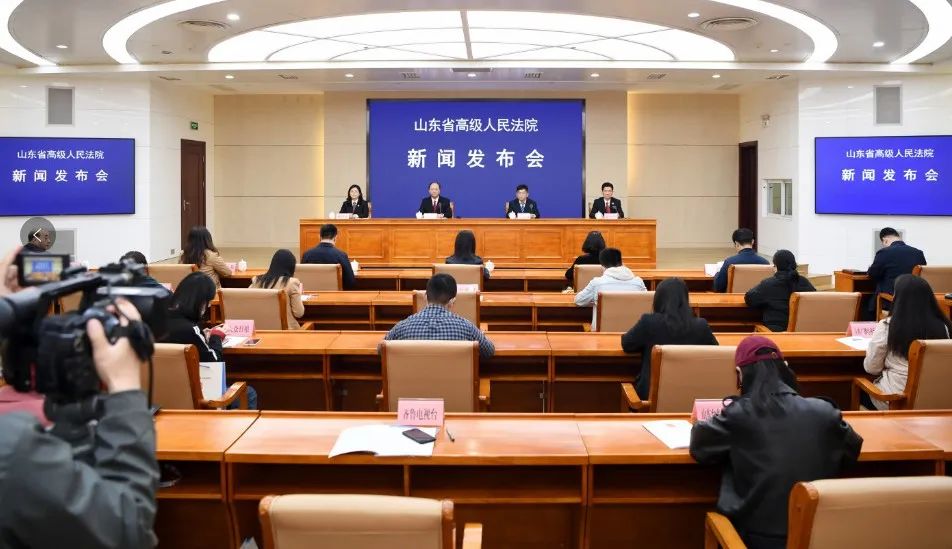
4月21日上午,山东高院召开知识产权宣传周新闻发布会,发布了《山东省高级人民法院关于加强农业领域知识产权司法保护保障农业强省建设和粮食安全的意见》。
山东省高级人民法院
关于加强农业领域知识产权司法保护
保障农业强省建设和粮食安全的意见
为深入贯彻落实党的二十大精神,落实党中央、国务院关于粮食安全的重大决策部署和省委农村工作会议安排,全面加强农业领域知识产权司法保护,助力打造沿黄“齐鲁粮仓”,推动农业强省建设,构建具有山东特色的粮食安全司法保障体系,结合全省法院工作实际,制定本意见。
一、统一思想认识,准确把握新时代加强农业领域知识产权司法保护的总体要求
1.指导思想。以习近平新时代中国特色社会主义思想为指导,全面贯彻落实党的二十大精神,深入贯彻习近平法治思想,认真学习贯彻习近平总书记关于粮食安全的重要指示,完整准确全面贯彻新发展理念,紧紧围绕省委农村工作会议确定的目标任务,努力服务和融入新发展格局,坚持农业农村优先发展,锚定“走在前、开新局”,为大局服务,为人民司法,扎实推动乡村振兴齐鲁样板提档升级,着力推动高质量发展,为农业强省建设提供有力司法服务和保障。
2.基本原则。坚持依法严格保护,切实维护社会公平正义和权利人合法权益,激发创新动力,立足农业大省、种业大省突出优势,强化科技和改革双轮驱动,服务高水平农业科技自立自强。坚持公正合理保护,加强对品种权人的保护,并注重保护科研机构、销售者、农民等主体的合法权益,维护市场不同主体间的利益平衡,服务种业自主创新和行业健康有序发展。
二、强化审判职能,构建农业领域全方位知识产权司法保护体系
3.加强植物新品种权保护。种子是粮食安全的关键,严格适用种子法、植物新品种保护条例及有关司法解释,秉持有利于权利保护的司法理念,依法适用举证责任转移、举证妨碍、文书提出命令等规定,强化证据保全、调查取证、委托鉴定等手段,降低权利人维权难度,保护种业创新者核心利益,促进种业自主创新,全面提升植物新品种司法保护水平。加大植物新品种侵权损害赔偿力度,严格落实知识产权惩罚性赔偿,严厉打击种子套牌侵权、重复侵权等严重侵权行为,切实提高侵权代价。
4.保障农民自繁自用合法权益。进一步明确品种权的权利边界,最大限度保护农民利益,实现农民与品种权人的利益平衡。农民在其家庭农村承包经营合同约定的土地范围内自繁自用授权品种繁殖材料的行为,不构成侵权;对于典型的农民自繁自用以外的行为,应当综合考虑被诉侵权行为的目的、规模、是否营利等因素予以认定。
5.拓展品种权保护范围及保护环节。扩大育种创新成果法律保护范围,品种权的保护范围由授权品种的繁殖材料延伸到收获材料,保护环节由生产、繁殖、销售延伸到种植、许诺销售、进出口、存储和为他人侵权提供收购、存储、运输、加工以及提供证明材料等帮助环节。
6.加强涉农专利保护。遵循粮食产业发展规律,研究把握关键农机和装备、植物品种生产方法、相关功能基因、编码蛋白以及载体等领域的专利特点,加大对种源“卡脖子”农业关键核心技术知识产权保护力度。依法加强涉农专利侵权行政行为的司法审查,促进行政执法标准与司法裁判标准统一。加强农业领域创新主体合法权益保护,准确界定涉农职务发明与非职务发明的法律界限,准确认定单位提供的物质基础与农业技术研发人员的智力劳动对技术成果形成所发挥的作用,依法支持对完成、转化技术成果作出重要贡献的人员获得奖励和报酬的权利,不断激发创新发展的潜力和活力。
7.加强涉农商业标志保护。依法加大对涉农商标侵权行为的惩治力度,切实保障权利人合法权益,促进农业知名品牌建设。强化涉农商标使用对确定商标权保护范围的作用,积极引导权利人持续实际使用商标,更加注重发挥商标识别功能,有效保障权利人合法权益。加强农业领域驰名商标、传统品牌和老字号的司法保护,促进农业品牌传承发展。
8.加强特色农业资源保护。结合山东特有的烟台苹果、寿光蔬菜、鱼台大米等农产品,研究完善涉农地理标志保护法律适用规则,引导地理标志权利正确行使,遏制侵犯涉农地理标志权利行为。通过地理标志保护机制加强特色农业资源保护,做好“土特产”文章,推动涉农地理标志保护与特色产业发展有机融合。
9.加强涉农商业秘密保护。依法保护育种技术秘密和经营秘密,守护好粮食安全的“种子芯片”,严惩侵害商业秘密的行为。准确把握信息披露与商业秘密保护的关系,依法保护植物新品种因申请注册、复审等原因向行政机关披露的品种信息。妥善处理农业领域商业秘密保护与从业者合理流动的关系,在依法保护商业秘密的同时,维护农业领域从业者正当就业创业合法权益。
10.维护农业市场公平竞争秩序。加强对农业领域经营者固定价格、分割市场等垄断行为的司法规制,维护统一开放、竞争有序的农业市场,牢牢把住粮食安全。依法严惩虚假宣传、商业诋毁、擅自使用涉农知名企业名称及仿冒涉农商品名称、包装、装潢等不正当竞争行为,强化公平竞争意识,营造不敢侵权、不愿侵权的法治环境。
11.依法适用惩罚性赔偿。对于侵权被行政处罚或者法院裁判承担责任后重复侵权、以侵害品种权为业、伪造品种权证书、销售白皮袋种子、对应当审定未审定或应当登记未登记的农作物品种进行推广等情形可以认定为情节严重,符合惩罚性赔偿适用条件的,依法按照计算基数的二倍以上确定惩罚性赔偿数额,赔偿总额最低是补偿性赔偿数额的三倍,让侵权者付出沉重代价。
12.强化涉农刑事司法保护。坚持依法从严惩处的基本要求,坚决遏制危害种业安全违法犯罪活动。严惩种子制假售假犯罪,对生产、销售伪劣种子,使生产遭受较大损失的,以生产、销售伪劣种子罪定罪处罚;因无法认定使生产遭受较大损失等原因,不构成生产、销售伪劣种子罪,但销售金额在五万元以上的,以生产、销售伪劣产品罪定罪处罚。同时构成假冒注册商标罪等其他犯罪的,依照处罚较重的规定定罪处罚。依法惩处与种子套牌侵权密切相关的假冒注册商标罪、侵犯商业秘密罪等犯罪,并将种子套牌侵权行为作为从重处罚情节,加大惩处力度。
三、深化改革创新,持续完善服务农业强省建设和保障粮食安全工作机制
13.完善涉农技术事实查明机制。建设全省统一共享的技术调查人才库并接入全国法院技术调查人才库,选任农业领域专业技术人员担任技术调查官。完善技术人员出庭、就专业问题提出意见并接受询问的程序。建立健全技术调查、技术咨询、专家陪审和技术鉴定的技术事实查明体系,为审理涉农技术案件提供有力技术支持。
14.推进涉农知识产权协同保护。深入推进知识产权案件“三合一”审判机制改革,提升农业领域知识产权司法保护整体效能。健全知识产权行政保护与司法保护衔接机制,加强与公安、检察以及农业农村、市场监管等部门的协调配合,建立信息资源共享和协同会商机制,拓宽交流渠道和方式,加强职能协作、优势互补,推动形成工作合力。协调建设涉农知识产权多元化纠纷解决机制,依托人民法院调解平台大力推进诉调对接,探索完善行政调解协议司法确认制度,推动构建“严保护、大保护、快保护、同保护”的工作格局。
15.强化涉农知识产权司法引导。加强与农业育种者、种子企业、品种权代理服务组织及农民专业合作社的联系与沟通,及时了解相关主体对种业知识产权法律需求,积极提供法律服务,引导研发机构和企业增强对育种材料、繁育技术、品种权的保护意识,自觉运用知识产权保护制度参与市场竞争,引导各市场主体尊重知识、崇尚创新、诚实守法、公平竞争。
16.提升涉农知识产权司法服务水平。深刻把握粮食安全新形势新要求,积极开展知识产权司法保护粮食安全专题调研,了解社会需求,总结审判经验,及时回应社会关切。健全人才培养培训机制,继续坚持精品案审判,进一步提升涉农知识产权审判人才专业化水平。加强涉农知识产权法治宣传,创新宣传方式,找准宣传亮点,依托4·26知识产权宣传周等活动,通过召开新闻发布会、发布典型案例等形式,积极宣传农业领域知识产权司法保护工作,营造种业创新良好法治氛围。
会后,山东省农业农村厅科教处处长蒋景春和山东大学教授、博士研究生导师、知识产权法研究所所长、山东省版权教学与科研基地主任崔立红接受了现场记者采访,分别从行政保护和司法保护衔接、全方位知识产权保护角度对山东高院出台的《意见》给予评价。



















